
The Exeter School Alumni Magazine








Captain Elizabeth Godwin’s remarkable story of resilience and passion














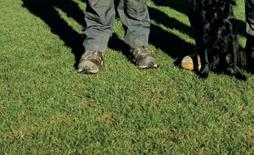
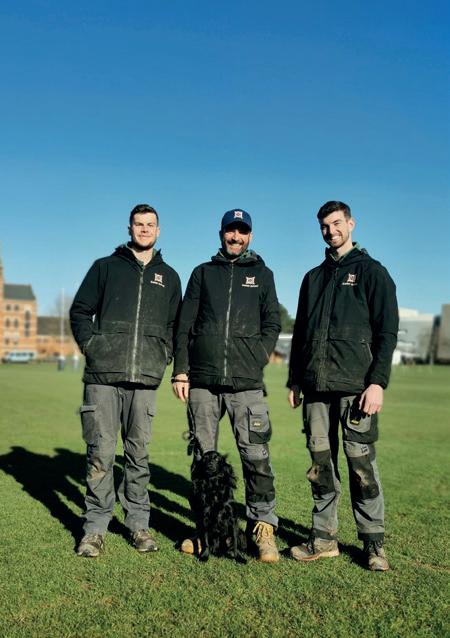

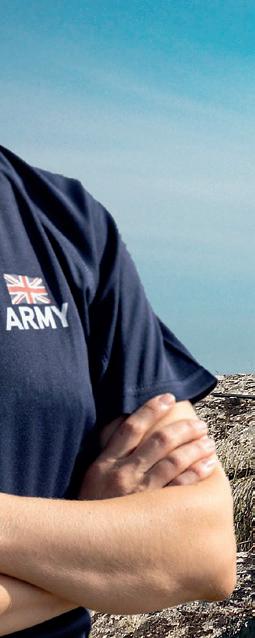


Thank you to our advertiser Savills, Exeter. Please go to exeterschool.org.uk/news/ to read an interview with Nick Jane (1998-2003), Associate at Savills.
We are sending this issue of The 1633 by post to all Exonians we hold an address for, except those who have specifically requested to receive copies electronically. If you would like to receive future issues electronically, please visit the ‘update contact details’ page of the alumni section on the school website.
Exeter School Alumni and Development office, Victoria Park Road, Exeter, EX2 4NS exeterschool.org.uk/alumni 01392 307080 alumni@exeterschool.org.uk exeterschool_alumni
Exeter School Alumni


Exeter School Alumni (Old Exonians) This publication is produced by Exeter School and printed by Lavenham Press. We welcome stories for consideration. Contributions may be edited for content and length. We welcome enquiries about advertising with us. Please get in touch with the Alumni and Development office for further details. Issue 17 summer 2025
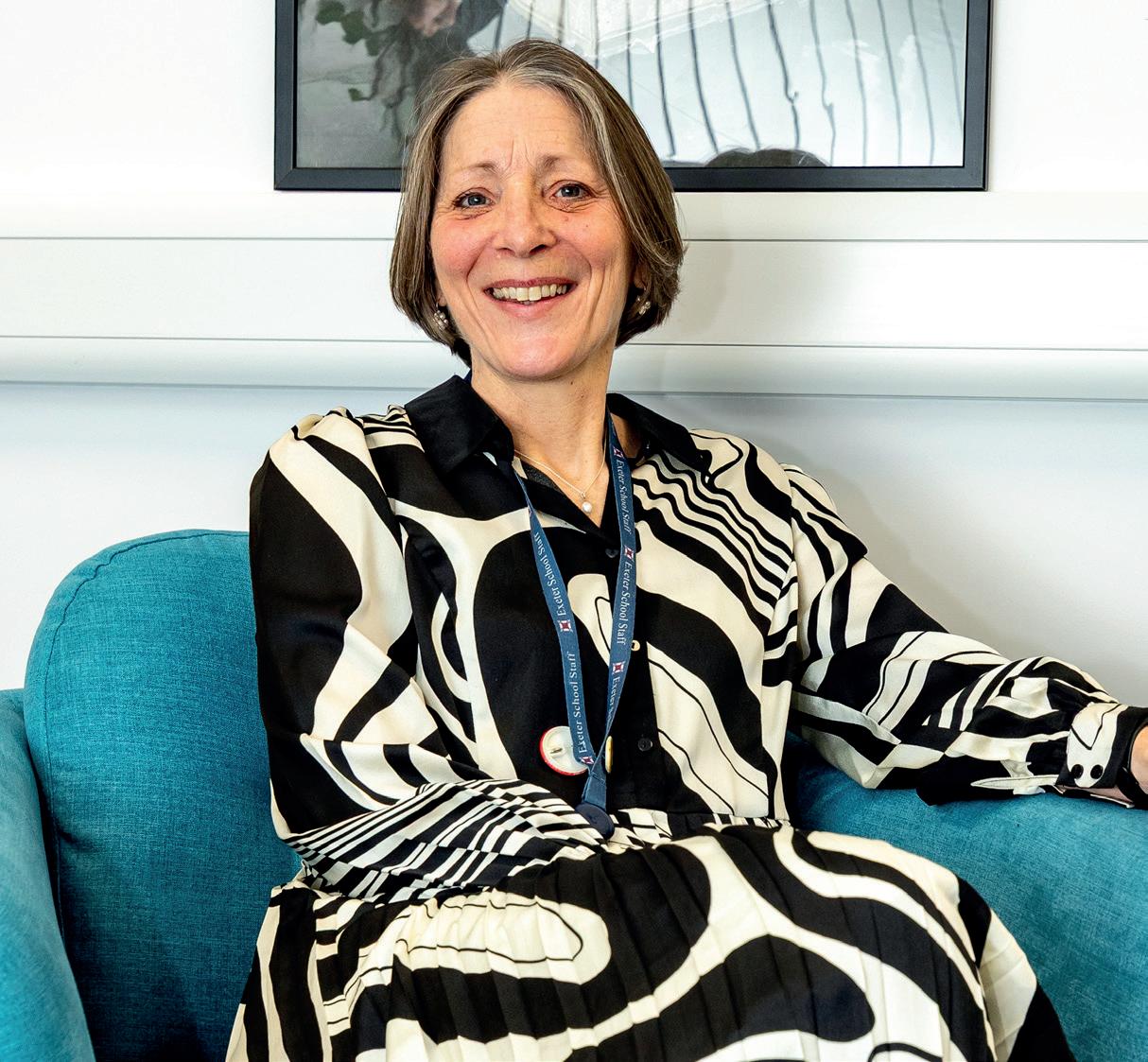
Welcome to this year’s edition of The 1633! It’s always a pleasure when the first draft of this publication arrives on my desk. I am consistently impressed by the accomplishments of our alumni community, and I thoroughly enjoy reading the updates shared in The 1633
This edition holds special significance, as it will be my final one before I take up the role of Chief Executive Officer at The British School in the Netherlands in September 2025. My time at Exeter has been incredibly rewarding, and meeting our committed alumni has enriched the experience. I’ll be leaving the school in the capable hands of Mr Graham Bone (staff, 2004-present), who will be acting Head for the coming academic year.
Our new pastoral structure is firmly established with new heads of year, section, and houses, and having fewer houses has certainly strengthened house spirit. I’ve witnessed a renewed sense of competition, with assemblies getting loud when house points are announced – I’m sure
many of you will remember this exciting energy!
Our beautiful campus has undergone significant change, too. The Sixth Form Centre was extended and refurbished over the summer, providing a wonderful space for our lower and upper sixth students. I encourage alumni who haven’t visited recently to return and see the improvements firsthand. We always love to welcome you.
Pupil numbers have grown to an historic high, and this positions us well as we navigate the challenges of VAT now being imposed on school fees. We remain confident in our financial stability and in providing excellent value through high-quality education. However, keeping fees as low as possible puts pressure on our bursary programme, which is primarily funded by fee income. Bursaries give life-changing opportunities to attend our school, and we need your support to sustain this programme.
Many of you attended when government grants provided fully-funded places for up to a third of pupils, benefiting all students. We remain committed to making the school accessible, as outlined in our founding principles. If you believe it’s important that bright and talented children in our local area benefit from an Exeter School education, now is the time to support our bursary fund.
Finally, we bid farewell to Helen Sail, Head of Year (Third Form) and geography teacher, who will retire at the end of this academic year. Her impact, particularly through her work as Head of Dowrich House, has been immense, and she will be greatly missed.
We are deeply grateful for your continued support. You are a vital part of the Exeter School family – once an Exonian, always an Exonian.
I hope you enjoy the stories from our community in this issue of The 1633. It is wonderful to have the opportunity to celebrate everything from meeting up with old friends to international awards – please keep us updated with your news. I would like to take this chance to thank a number of individuals in the alumni team. Firstly, Ali McGeown, our communications and alumni officer, whose dedication and hard work has brought this magazine to life. Thanks also to Kevin White
who, unless my calculations are faulty, is now in his fifth decade of volunteering in the school archives –an extraordinary commitment to the school. And finally, a name that will be familiar to many, Richard Fryer, who is undertaking stellar work in the archives and digitising our fascinating historic records. Thank you also to all those in our community who have contributed their stories, joined us for events, or volunteered your time and expertise over the past year. And a particular
thanks to those who support our bursary fund. We want more bright and talented children from our local area to have the opportunity to benefit from an Exeter School education, and to do this we need the support of our community. Please do get in touch if you are interested in finding out how you can support the next generation of Exonians.
Alice Holohan Director of Development and Alumni Relations
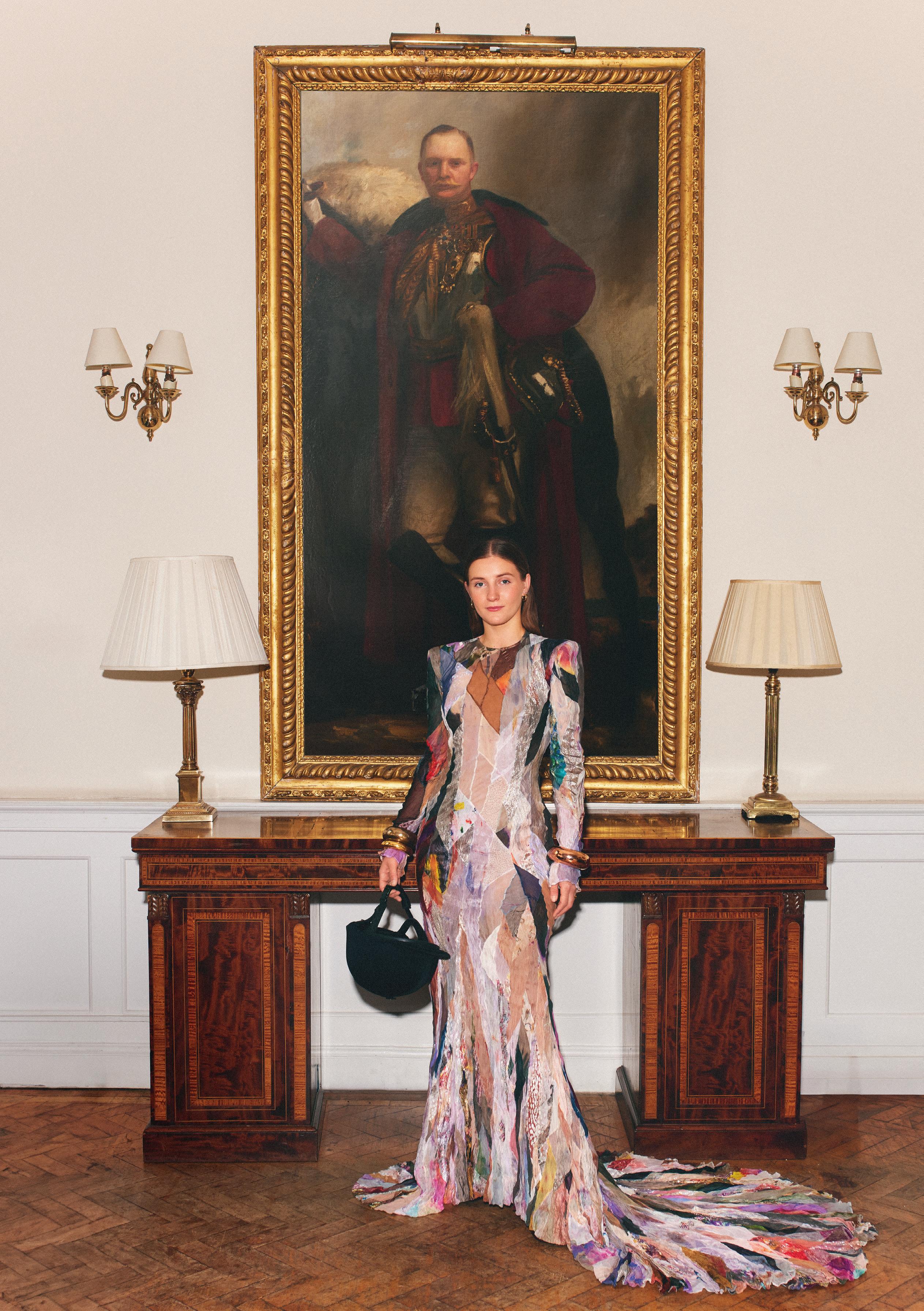
Captain Elizabeth Godwin’s (2004-2013) career trajectory is a testament to determination, passion, and a willingness to embrace challenges.
Elizabeth’s journey has led her through diverse and demanding roles in the military, including her remarkable position as the first female officer to be commissioned into the Life Guards – the most senior regiment of the British Army and part of the Household Cavalry. Elizabeth’s story, which spans her early years in Devon to her current responsibilities in the British Army, reflects her unwavering commitment to excellence, her love of leadership, and her passion for the military.
Elizabeth’s mother, Susan, recognised the need for a good education, and did everything she could to ensure that Elizabeth attended Exeter School. It was here that she discovered her passion for hockey, a love that would shape much of her early life. With its strong emphasis on both academia and sport, Exeter School provided an environment where her talents could flourish and she recognises how lucky she was to have the opportunity to attend the school, “My mum worked very hard. I feel incredibly thankful to her, she believed in me, and I owe her so much. There are a lot of people in this world who don’t have this leg up; if you don’t use it to build a life you enjoy, then it’s surely a waste.”
Elizabeth’s formative years
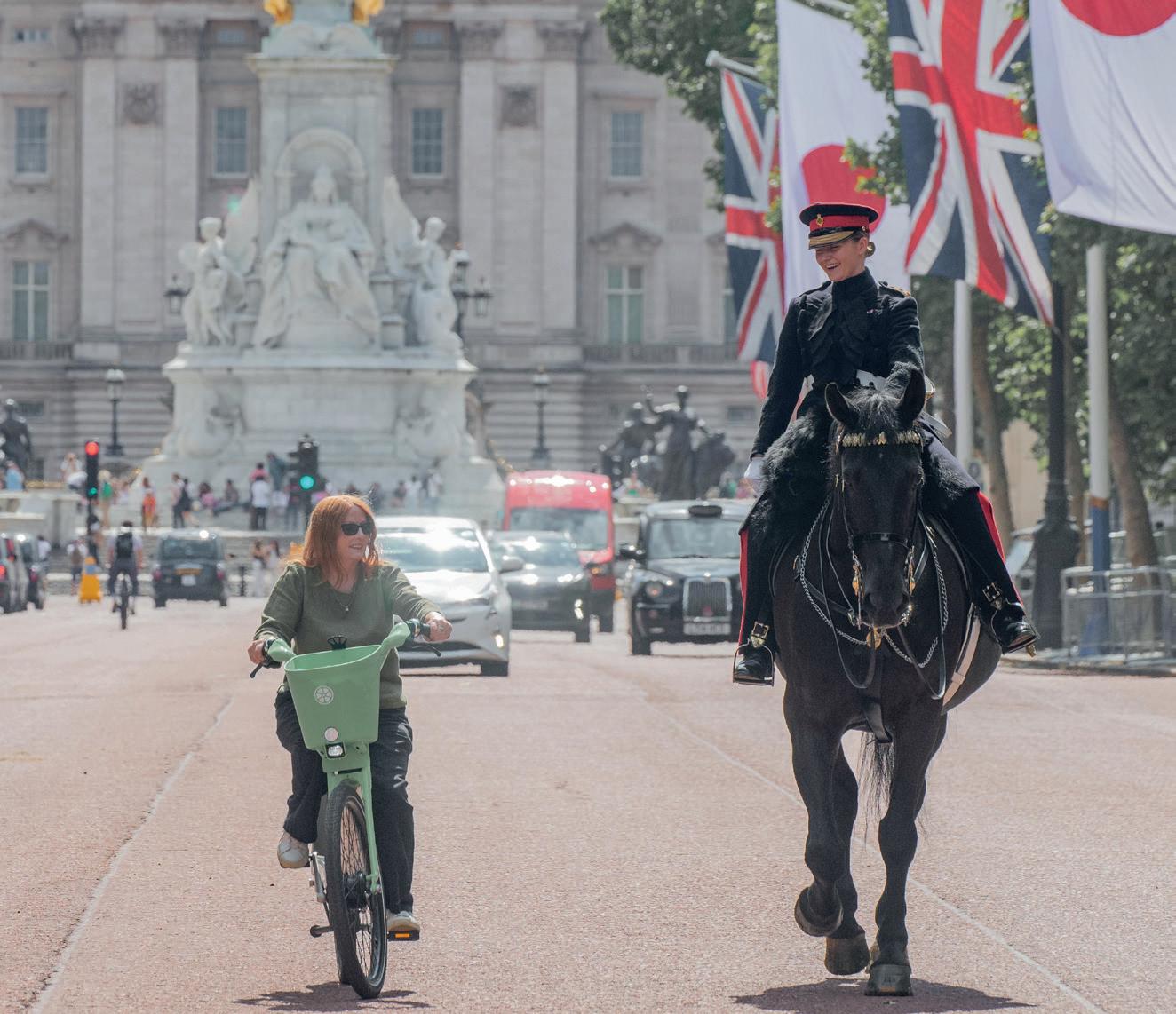
“There are a lot of people in this world who don’t have this leg up; if you don’t use it to build a life you enjoy, then it’s surely a waste.”
at Exeter School laid a strong foundation for her future, instilling the discipline and resilience that would serve her well in her later military career. As Elizabeth reflects on her time at school, she fondly remembers the support of teachers who played pivotal roles in her early years. “Guy Willson (staff, 19902022), my maths teacher, was the most influential teacher throughout my time at school,” she shares. “He believed in both my abilities and my character, and I remember wanting to work very hard for him.” Emily Dunlop (staff, 2009-2024), Elizabeth’s former form tutor and English teacher, also had a lasting effect. Elizabeth describes her as being, “firm but encouraging” and “always pushed me to my full potential.”
Elizabeth chose to spend her sixth form years at Trent College, Nottingham, where she went on a hockey scholarship and played for Beeston Hockey Club.
Elizabeth’s time was taken up with playing sport, but she also had an eye on her future career. Her interest in medicine led her to pursue an A Level course with the aim of securing a place in medical school. However, the journey to medicine wasn’t straightforward. “I narrowly missed out on an A in chemistry, which was a stressful, but good learning experience,” she recalls. Though disappointed, Elizabeth did not allow this setback to deter her from her goals. Instead, she found a new path, opting to change course and pursue a nursing degree at King’s College London.
This decision marked a pivotal point in her career, though it wasn’t without its challenges. “During my nursing placements, I found the practicalities of twelve-hour shifts in a hospital very challenging,” she admits. With her love of the outdoors, Elizabeth realised that nursing, particularly in an urban hospital setting, might not be the right fit. Nonetheless, the experience proved to be a valuable lesson in resilience. Elizabeth’s time in the NHS, dealing with the high-pressure environment of emergency services, instilled a resilience that would stand her in good stead going forward and
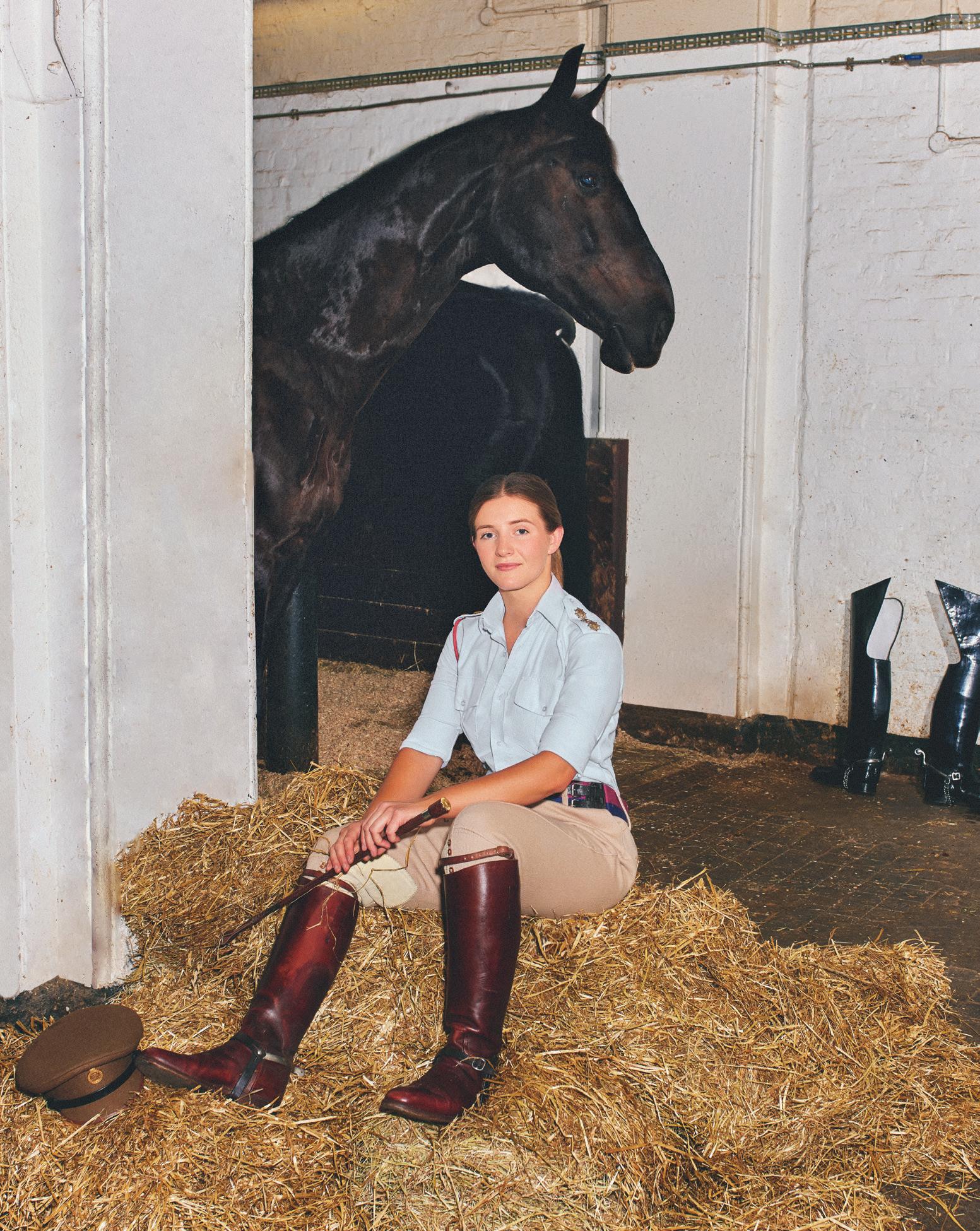
gave her a deeper understanding of the challenges faced by healthcare workers. Elizabeth reveals, “My experience working for the NHS feeds into my rhetoric now, how I manage troop leaders and troop sergeants that work for me, and how I try to get the most out of them as individuals.”
Elizabeth’s time in nursing was brief, and while she appreciated the work of her colleagues, she knew her heart lay elsewhere. She had always harboured an interest in the military, and this passion was nurtured during her time at university, where she joined the Officers’ Training Corps (OTC). The OTC offered an outlet for her leadership skills and a chance to explore her interest in the army. “The army became a bit of a backbone for me,” she says. “It was a safe space that I knew I thoroughly enjoyed.” It was here that Elizabeth first considered a career in the military more seriously.
Before long, Elizabeth was accepted into Sandhurst, the prestigious Royal Military Academy. The time she spent at Sandhurst was a defining moment in her life. “Every
day was a challenge, and I met a lot of like-minded people,” she recalls. “My platoon was full of driven characters, and we were lucky to have such inspiring instructors, both factors contributed to us achieving the Sovereign’s Banner at the end of Sandhurst.” Her experience at Sandhurst was not without its challenges, particularly as a woman in a traditionally male-dominated institution. Elizabeth explains, “Not long before I started at Sandhurst women were in all-female platoons. But you work with men every day in the army so there’s no reason to divide us and I was lucky to serve in a mixed platoon. There were four females in my platoon of 28.”
Elizabeth’s determination and strong character made her an important part of the team. “In my experience, men and women work really well together and I am fortunate to have such supportive friends at regimental duty,” Elizabeth continues, “we tackle problems differently, the way we prioritise issues and formulate solutions.”
During her time at Sandhurst, Elizabeth visited the Household

Cavalry at Bulford. There she was interviewed by the commanding officer, who she describes as a “hugely inspiring character.” She was offered a place in the Life Guards at the Regimental Selection Board, and explains that because women hadn’t been in the regiment before, there was no female dress, “the first task was to design the uniform!”. Elizabeth sadly didn’t experience a pass off parade owing to the restrictions of Covid at the time, but is grateful that her training was not interrupted by the pandemic.
After two years serving in the Life Guards at Bulford, the adjutant informed Elizabeth that she was being loaded onto the riding course, which saw her being put through her equestrian paces at Windsor. When asked about the bond between a soldier and their horse, she says, “it is hugely important – understanding your horse equips you to react and put in the required aids before a situation is escalated. We’re not just there to look pretty – our role is to escort the monarch on state ceremonial occasions and provide an element of security.”
Her experience with the Life Guards reached a poignant moment when she took part in the funeral procession for Queen Elizabeth II. “It was a privilege,” she says. “Marching down The Mall, I gave the salute at Wellington Arch as Her Majesty came through Hyde Park.” The experience was an emotional one, underscoring the profound respect Elizabeth has for the monarchy and her role in protecting it.
The coronation of King Charles III was another milestone in Elizabeth’s career. “I led a division of 30 horses just behind the gold state coach,” she recalls. “It was the most exhilarating experience.” As she commanded her division through The Mall, she was acutely aware of the historical significance of the event. “You’re
on high alert, but halfway down The Mall, I settled into it and then enjoyed the atmosphere,” she recalls, describing the feeling of pride and excitement as she led the division.
Elizabeth explains it is important to maintain ‘green skills’ whilst on ceremonial duties. “A career highlight has to be leading a team of ceremonial soldiers on the Cambrian Patrol, a 70km march across the Brecon Beacons. Each member of the team must carry around 45kg of kit and complete a series of tests on tactical actions. The patrol is scored on each test including orders delivery, swimming across a reservoir and casualty extraction drills. We were awarded a silver medal, and I was extremely proud of the team considering the short amount of training time and experience.”
Her advice to young people considering a career in the military is particularly poignant. “I wouldn’t be where I am now if Exeter School hadn’t provided that link,” she says. “I’m very thankful for that process and passionate to encourage other young people to consider a military career.” Elizabeth’s story is a powerful reminder of the importance of following one’s passions, embracing challenges, and making the most of opportunities, no matter where life takes you.
Captain Elizabeth Godwin’s journey from Exeter School to the Household Cavalry is a remarkable story of resilience and passion. Her experiences in the military, from Sandhurst to ceremonial duties with the Life Guards, have been shaped by her commitment to excellence and her ability to adapt to diverse challenges. Throughout her career, Elizabeth has exemplified the values of perseverance, and she continues to inspire the next generation of leaders to pursue their dreams and break down barriers.
“Marching down The Mall, I gave the salute at Wellington Arch as Her Majesty came through Hyde Park.”

Teachers’ names often become etched into the heart of an institution. The 1633 caught up with three such teachers, whose stories take us from the rich history of Exeter School to their lives today.
The 1633: Could you please give an overview of your role(s) at Exeter School?
John Davidson: I joined Exeter School in 1976 as the ‘young geography teacher’, working alongside Head of Department, Bob Jenner (staff, 19571988) and John Jago (staff, 1967-1996). Previous young geography teachers had left after a couple of years, but I liked teaching in the school so I stayed. I was an officer in the RAF section from 1979 to 1992 and officer commanding RAF section from 1981 to 1988. In 1982, I was asked to set up a new house for day pupils called
Townsend House. When Bob Jenner retired in 1988, I became Head of Geography. I joined the senior management team in 1998 and my responsibilities included helping to prepare the school for ISI inspections, and co-ordinating the school calendar.
In 2012 Headmaster Bob Griffin (staff, 2003-2020) asked me to set up the alumni office. It was a great privilege, particularly as I met up with many past pupils whom I had taught.
T1: What was school life like then for pupils and staff?
JD: Exeter School in the 1970s was a busy place, very much like today. Many pupils lived for sport. The CCF contingent was one the largest in the West Country; many pupils were involved in music and drama and
participation in Ten Tors was popular. There was no sports hall until 1979, no drama studio until the 1980s and the CCF occupied a range of leaky huts. Pupils were generally well behaved, but pranks were not uncommon, and you had to keep your classes busy and engaged. Although it was a boys school, girls from Maynard visited on a Friday afternoon for joint general studies and some A Level subjects included girls from both from St Margaret’s and Maynard. Throughout my time at the school, it was a happy place, and most pupils were very purposeful.
T1: What does it mean to you to be part of the alumni community at Exeter School?
JD: I felt very strongly when I came to
Exeter School that there was a great sense of history. The Old Exonian Club has records going back to 1880 and the long-established London dinner was an opportunity to connect with those who had been at the school many years ago. When I set up the alumni office, I was able to organise events around the country to reconnect Exonians with the school, helped in particular by Bob Griffin, the alumni secretary Karen Dart (staff, 2014-2021), and Head of Sixth Form Ali Marsh (staff, 2001-2022). We also started The 1633 magazine to keep Exonians in touch.
T1: Since leaving Exeter School, where has life taken you?
JD: I enjoy doing occasional supply teaching, A Level tuition and writing geography articles. I created, along with another retired Head of Geography, a not-for-profit website to provide free resources –geographysouthwest. I spent four months training to be an Exeter Redcoat guide and a cathedral guide. I give talks to local organisations and help run a society called the Exeter Forum which provides a weekly programme of talks.
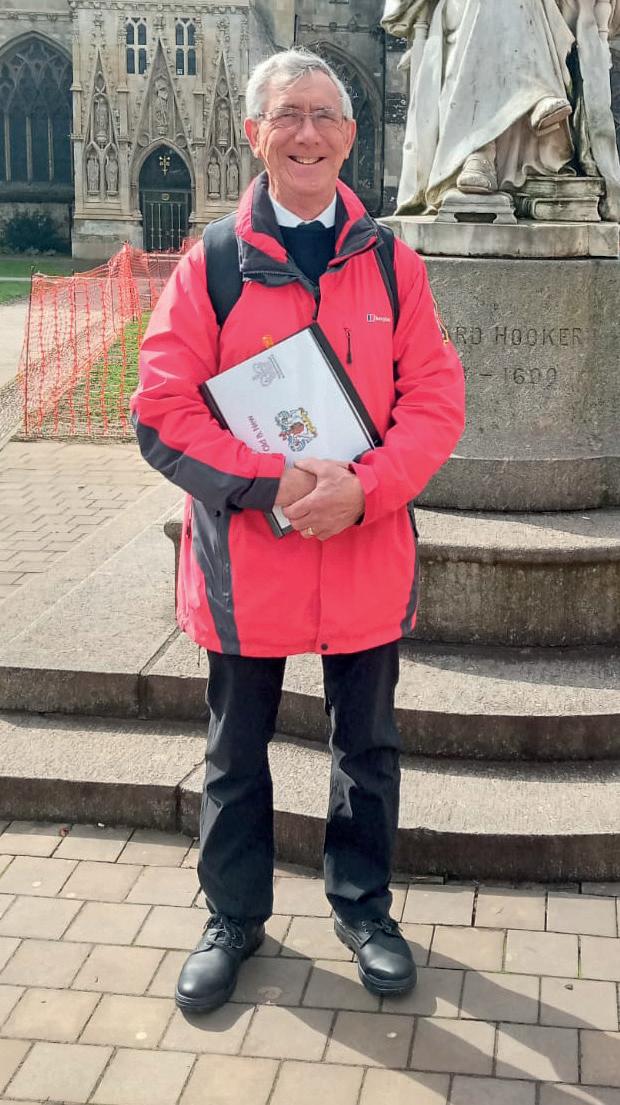
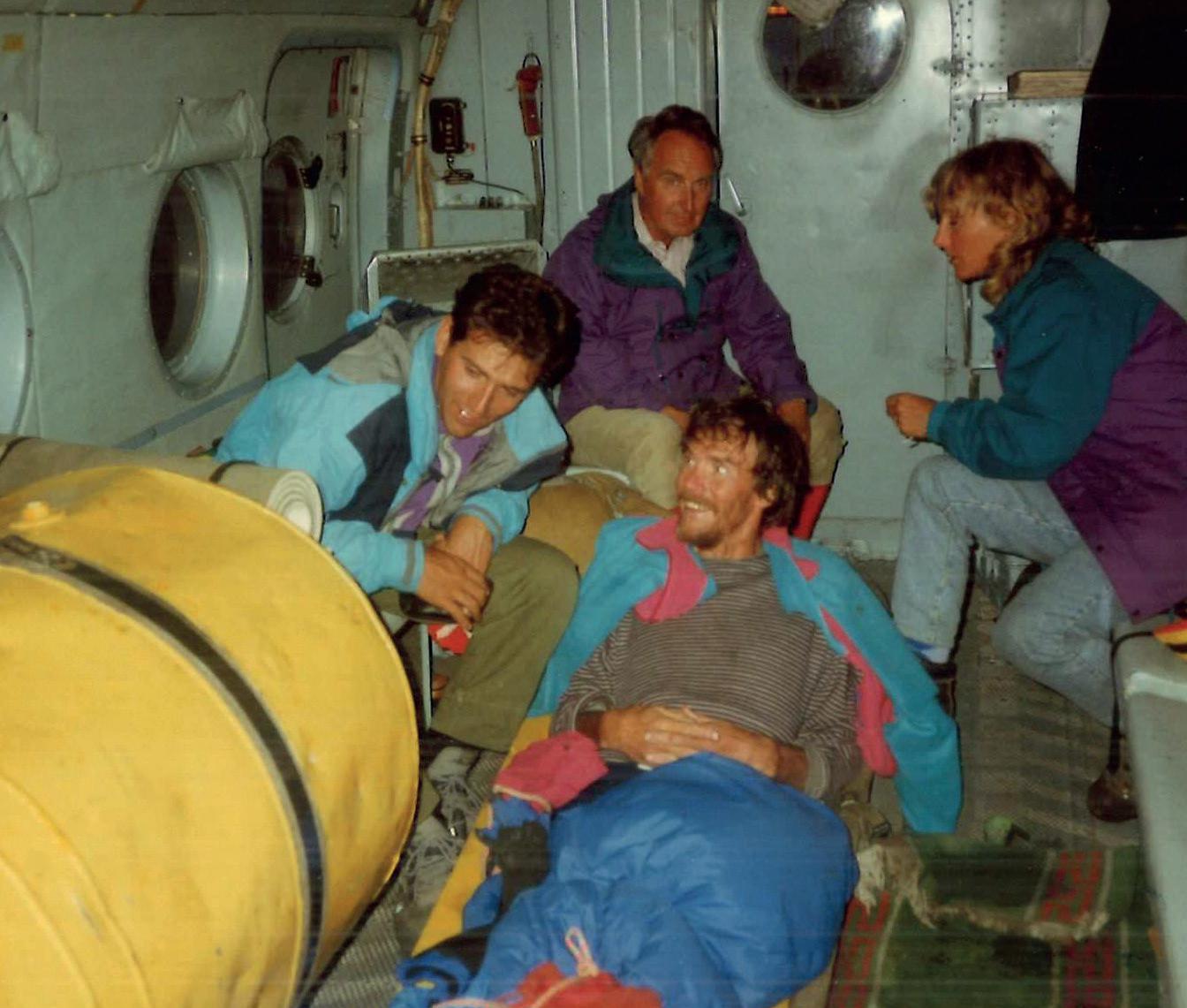
The 1633: When did you join Exeter School?
Dickie Snailham: In 1957 I joined as a member of the small history department headed by Eric Halladay (staff, 1955-1960). Subsequently I became house tutor in School House under John Marsden (staff, 19531968). I was also chairman of the Crossing Club. When Halladay got a lectureship at RMA Sandhurst, I became Head of History.
T1: What was school life like for pupils and staff?
DS: I had great admiration for the Headmaster, Francis Kinnier Paul (staff, 1950-1965). He ran the school with firmness and fairness. It was a happy masters’ common room and generally a happy, well-run school.
T1: What have you most missed about working at Exeter School?
DS: I miss the camaraderie of the common room and the classroom. There is nothing to touch the
“There is nothing to touch the enjoyment and fulfilment of teaching.”
enjoyment and fulfilment of teaching.
T1: Do you keep in touch with former colleagues?
RS: Not any longer. Most of them have died. I was in touch with John Marsden until his death. I do however keep in touch with former pupils, among them are John Osborne (1962-1968), Jon Lewis (1954-1962) and David Leon (19541961). John lives in Hirst, which is not far from Windsor, where I am. We have a number of shared friends locally, so we meet socially quite often. I taught him in third form and coached him on the rugby field. He still remembers my teaching
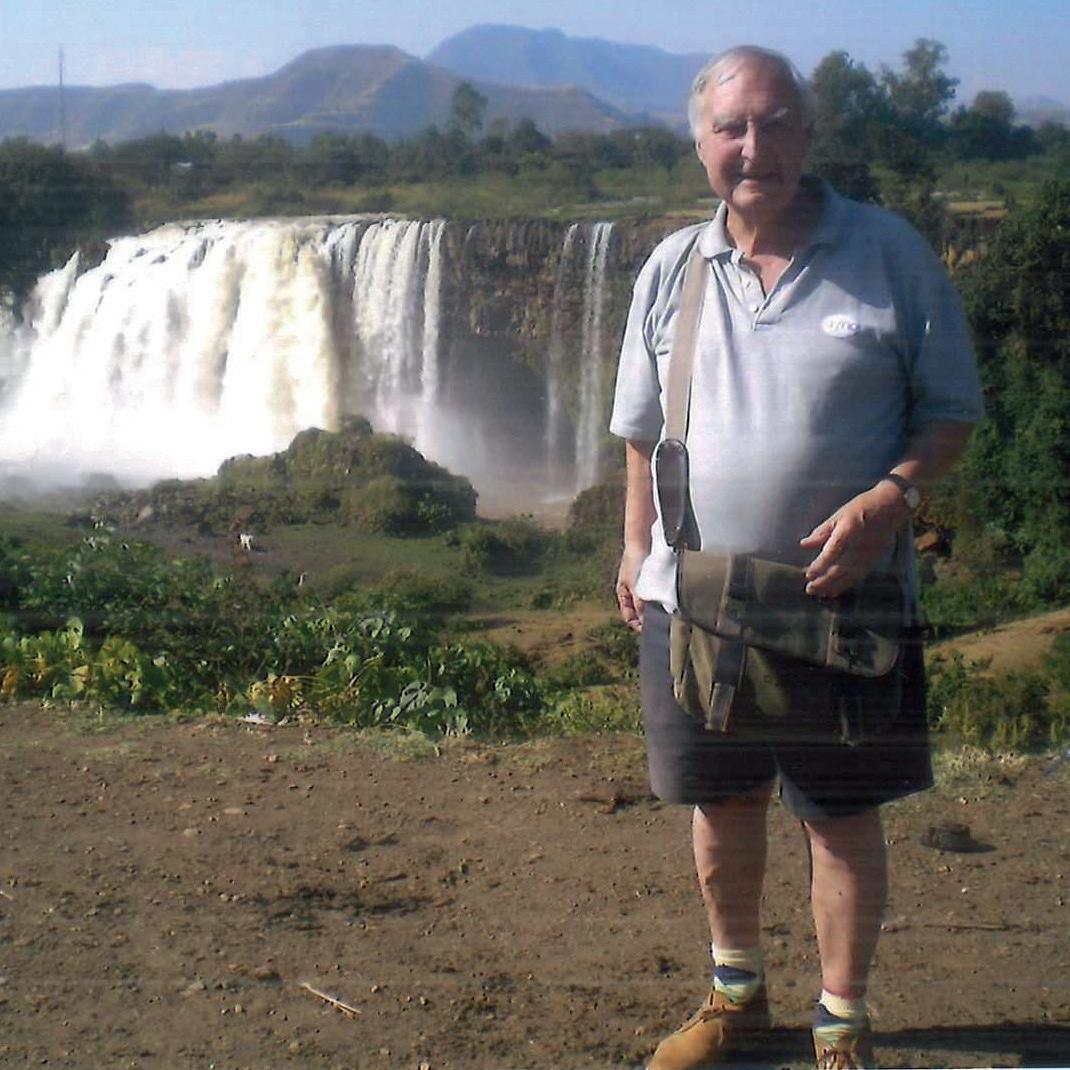
about the 15th century Portuguese discovery of the West African coast and can quote the names of the early navigators. He calls me ‘sir’ and apologises for not having brought his homework.
Jon Lewis, I have only recently been in touch with. He was one of a fine group of sixth formers in my last years at Exeter School, who used to meet with the Crossing Club in the library on a Saturday evening to discuss the events of the day in the outside world.
David Leon lives in West London. He keeps me in touch with the meetings of London OEs.
T1: What does it mean to be part of the alumni of Exeter School?
DS: A good deal. I had eight very much cherished years at the school and am glad to keep in touch. I felt at home as soon as I arrived, surrounded by the work of the distinguished mid-Victorian architect, William Butterfield. I was at Keble College, Oxford – one of his finest works.
T1: Since 1965, where has life taken you?
DS: Eric Halladay left Sandhurst to take up a lectureship at Durham University and he suggested that I might like to apply for his vacant post. I did and I got it (with, I imagine, some help from Eric!). In 1965 I drove up to Canterbury in Surrey to begin a 25-year spell as an academic in the prestigious Royal Military Academy. I met a sapper captain called John Blashford-Snell, who has made a name for himself as an expedition leader. He and I became great friends and still are (he’s 88 and continues to lead parties to places like Guyana or Mongolia). In short, I have been with him on the following: RMAS expedition into Ethiopia in 1966, Blue Nile expedition in 1968, Dahlak islands expedition (Red Sea) 1970-71, Zaire River Expedition in 1974-75, Kota Mama expedition to Bolivia and Paraguay 1998-2001, and I wrote my first two books about the first two – The Blue Nile Revealed (1970) and A Giant Among Rivers (1976).
I have been invited to give illustrated talks to a variety of audiences from 1969 to the present day. Total so far: 1,877 (but I’ve virtually given up now), 287 to Women’s Institutes!
After my retirement from Sandhurst in 1990 I took up leading tour groups for Thomas Cook, Jules Verne, Ace Study Tours, and NADFAS, and lectured on cruise ships. I also got involved in quizzes… Fifteen to One, Busman’s Holiday, which the RMAS team won, Mastermind (semi-finalist 1973). That’s probably enough trumpet blowing!
T1: What does a day in your life look like now?
DS: Up at 5am in the summer, later in autumn and winter… coffee, breakfast, Daily Telegraph, short snooze, collect and deal with the mail. The afternoon is spent reading, doing cryptic crosswords (Spectator and Mephisto in The Sunday Time s, I won The Spectator last year!). On Tuesdays I am a guide at the Windsor Guildhall (since 2011). Ten minutes in the garden with the secateurs if it’s sunny. Tea at 4pm, Pointless and Richard Osman’s House of Games, news and a G&T at 6pm, red wine to follow. Bed at 8.30pm.

The 1633: What was your role at Exeter School?
Trevor Huxtable: Before joining Exeter School I taught at Mill Hill School in North London for three years. I was then commissioned into the Royal Navy and after this served as Head of Physics at Chichester High School for Boys.
I joined Exeter School in 1975 as Head of Physics which continued until I retired in 2004. In 1982, I was appointed Head of School House with my wife Rosemary for a period of 12 years and in 1994, I became Director of Studies, in today’s parlance “Deputy Head (Academic)”. I retired in 2004.
I actively supported sport in the school and was head of cricket for a couple of years.
T1: Did you and Rosemary live on site?
TH: Rosemary and I lived in the tower with our two sons, Simon (1979-1986) and Robin (1980-1985) and our daughter, Gillian (1987-1989). The boarding house was one big family, with over 50 students from the southwest region and across the world.
T1: What was school life like when you joined the school?
TH: Exeter School was much smaller than now with about 600 pupils. There were eight houses, which included School House in 1975 and expanded to nine and then 10 houses after boarding ceased and as the school grew.
The school was very short of money when I arrived and for the next decade. Any new building or major refurbishment had to be funded by a dedicated appeal. As evidence of the lack of money my laboratory hadn’t been decorated for many years, so myself and some of my sixth form pupils decorated it.
T1: What have you missed most about Exeter School?
TH: It has to be the teaching staff and
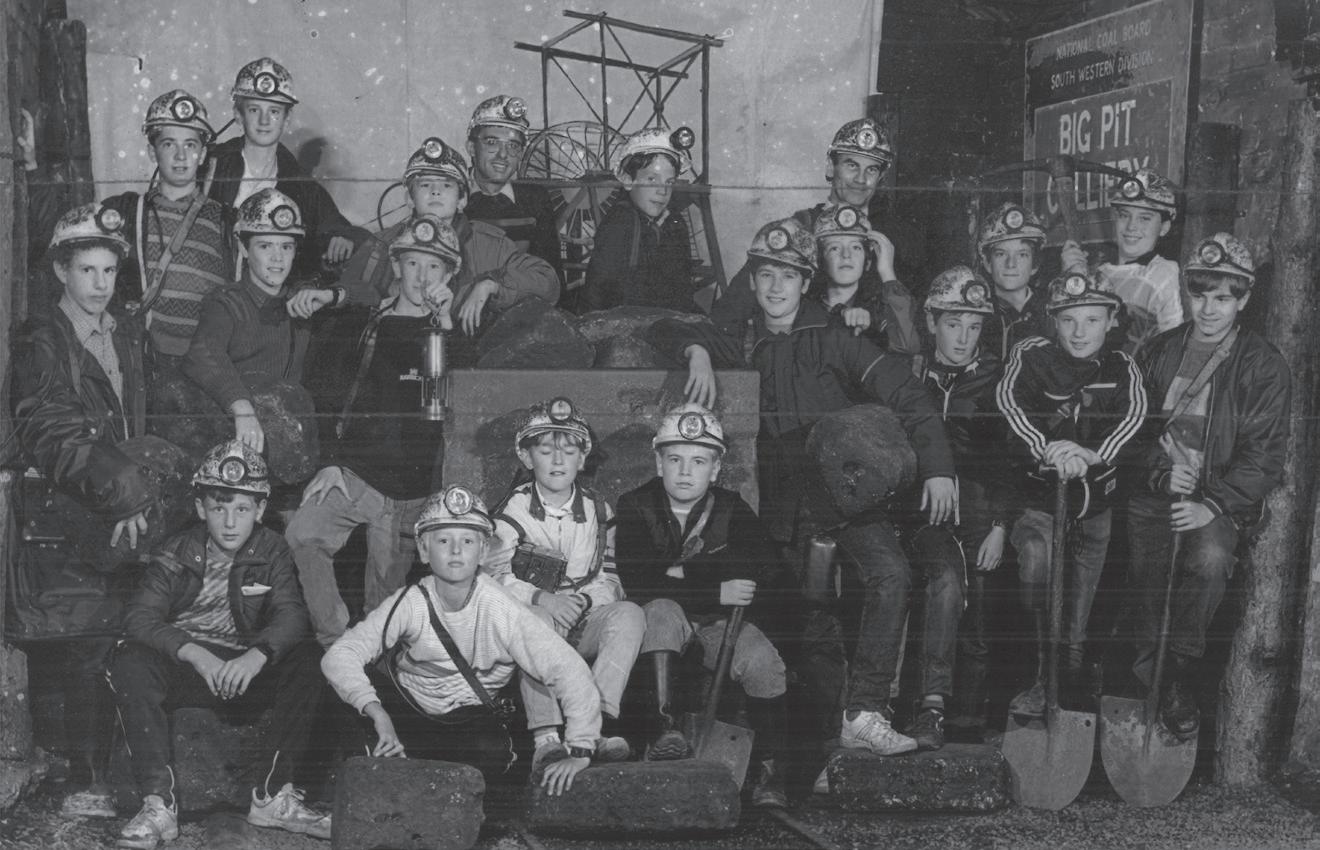
the pupils. Teaching is not just about giving information to pupils and seeing how they react but preparing them for later life, that’s really your task. You should be looking to give them the tools to progress and adapt to the new challenges ahead – I miss this.
T1: What does it mean to be part of the alumni of Exeter School?
TH: When you have a career that spans such a long time, it’s a joy to hear the many achievements that past pupils have gone on to make. Alumni events in London and other cities provide the opportunity for teachers and alumni to meet socially.
T1: Since leaving Exeter School, where has life taken you?
TH: I was invited by Tommy Cookson MBE, former Head of Sevenoaks School and Winchester College, and Geoff Goodall (Headmaster, 19791992) to help with a charity, now called Physics Partners, he set up to train physics teachers, with the aim of supporting the 800 secondary schools in the UK without a specialist physics teacher. I worked there up until almost the pandemic.
Before Rosemary’s illness (Parkinson’s disease), we used to enjoy cruises. We’ve been on about 14 around Europe. We would often go to London, Wales and Guernsey to see our families, and we have three grandchildren now too.
I used to play golf with John Jago
(staff, 1967-1996), Basil Selley, (staff, 1958-1994), Ivor Clarry (staff, 19521979) and Ian Davis (staff, 1970-1974 and 1991-2002), and I still enjoy golf now.
T1: What does a day in your life look like now?
TH: Rosemary and I visit local garden centres, Darts Farm, Powderham, or the seafront – it’s important for Rosemary to get out so twice a week we go to an exercise class.
Rosemary used to go to a watercolour class, and now I have scanned all her significant pictures and use them as cards. She was always overly critical of her talent, but now she realises that her watercolours are quite good!
In August 2025 we will be celebrating our 60th wedding anniversary, with family and friends.
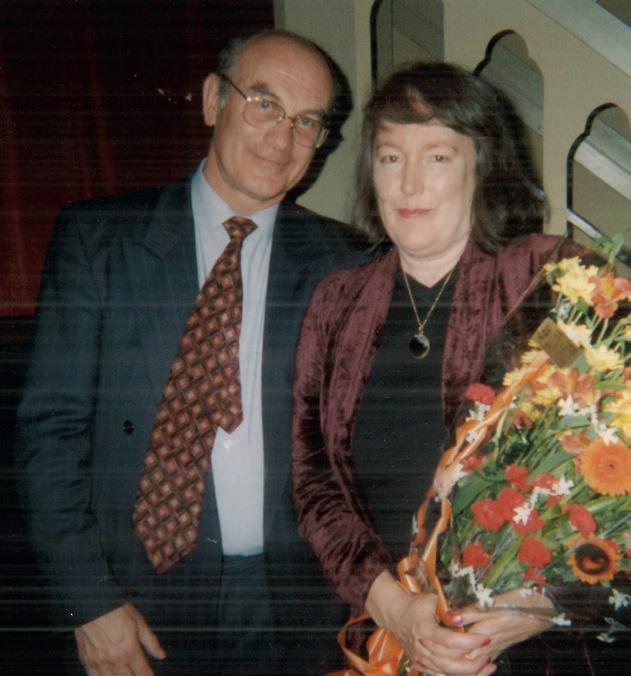
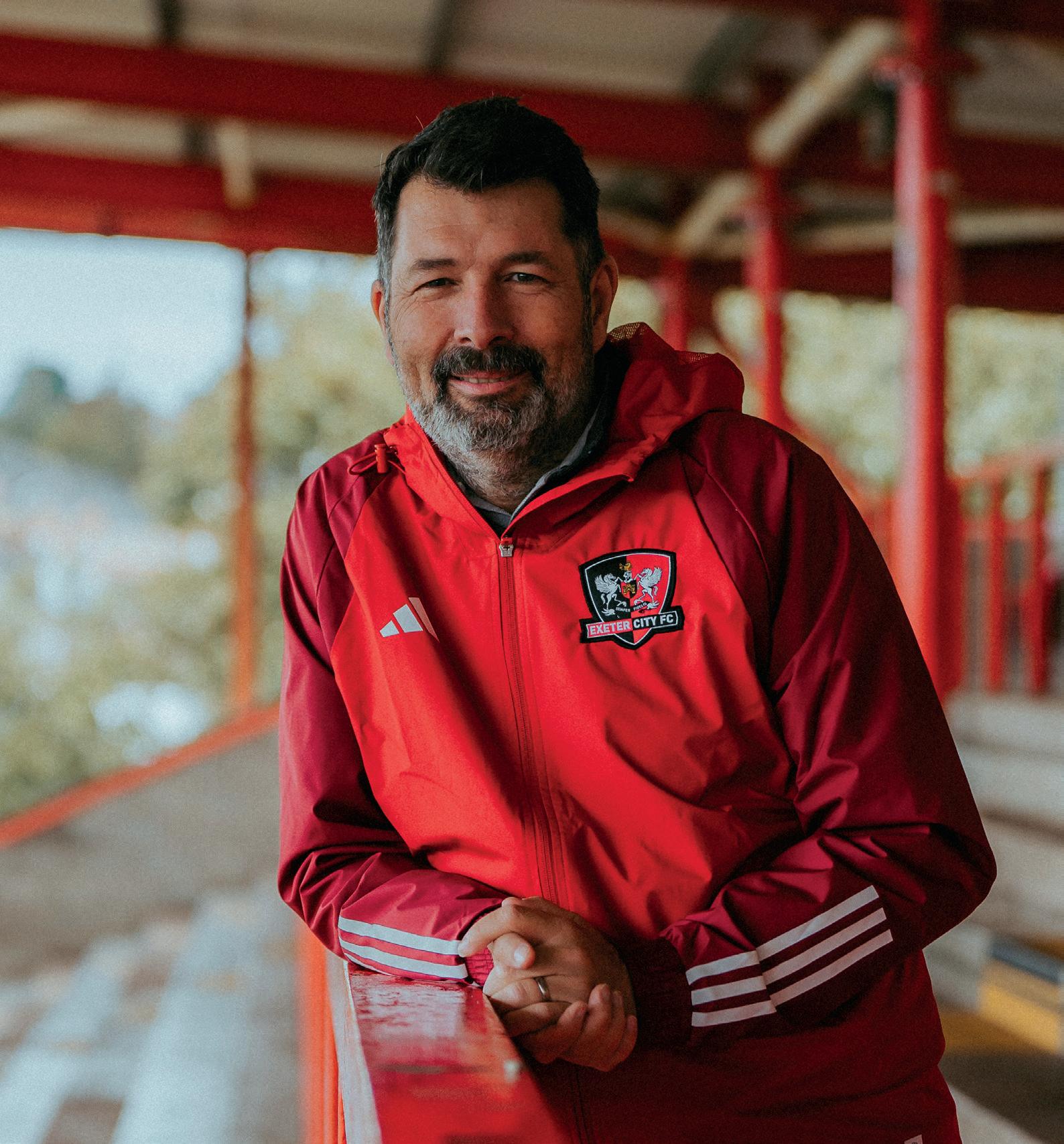

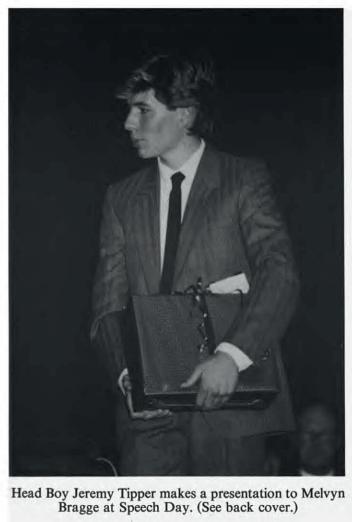
Though Jeremy was born in Kent, his family moved to Hong Kong when he was four. He was one of the fi rst international boarders at Exeter School and has a family connection to the school – Headmaster, Geoff Goodall (staff, 1979-1992) is a distant relation. “The fi rst couple of years were really hard”, Jeremy recalls, describing the loneliness he felt, “I was the only overseas border and surrounded by Devon farmers’ sons who all returned to Moretonhampstead, Okehampton or Crediton at the weekend! So actually, it was pretty lonely for the fi rst couple of years because I was literally the only person in the boarding house at weekends.” This early challenge was formative, as it taught Jeremy resilience and independence, values that have shaped much of his life.
resilience and independence, values and close friend. A shared love




The turning point came in his third year when Trevor (staff, 1975-2004) and Rosemary Huxtable took on roles in School House. They brought a warmth that helped Jeremy feel at home, and their son Simon Huxtable (1979-1986), became a close friend. A shared love of sport, and Exeter City Football Club, deepened this connection. From then on, he was able to enjoy school more fully, fi nding companionship and support that would leave a lasting impact.
Emma Corney
Since Jeremy Tipper’s (1979-1986) time at Exeter School, life has taken him on a dynamic path through international business, entrepreneurship, and, more recently, a return to his roots in Exeter as interim CEO of Exeter City Football Club.
After leaving Exeter School, Jeremy accepted a university sponsorship from NatWest Bank, which allowed him to work for a year before studying banking and fi nance at Loughborough University. Although the degree was valuable, he credits his time at Loughborough more for the “sporting endeavour,” playing hockey and cricket extensively. It was also where he met Helen, now his wife of 29 years, in the bar where sports teams gathered after matches.
After graduation, Jeremy worked with NatWest but found corporate
life wasn’t for him. “It wasn’t very meritocratic and too rules-based for me,” he explains. He transitioned to a career with Robert Walters, a recruitment business, where he worked for seven years, including a pivotal role in establishing their business in Australia and New Zealand. Moving to Sydney with Helen shortly after they married, he thrived on the independence and responsibility, effectively running the business and opening offices across the region. “It was a very influential period because it was effectively like running your own business. There was nobody there to tell me what to do or how to do it, so I had the opportunity to learn so much and take some risks.”
Returning to the UK, Jeremy realized he preferred the freedom of running his own business over working for others. In 2000, he started Capital Consulting, a recruitment outsourcing business that grew to serve clients in the UK, Europe, and Asia, including an office in Hong Kong. This venture was a career highlight, not only professionally but personally, as he reconnected with his roots in Asia. Jeremy expresses, “I still have a big chunk of my heart in Asia”. Capital Consulting was eventually acquired, but the entrepreneurial spirit led him to establish a second company, the Talent Collective, in 2010 with several former colleagues. That company was later acquired as well, bringing his business-building phase to a close. Today, Jeremy has a “portfolio career,” investing in early-stage HR technology companies and advising founders, “while it was incredibly rewarding building your own companies, I get more joy now from helping other people succeed,” he says.
Reflecting on his Exeter school days, Jeremy cherishes memories of the sixth form - a time of increased freedom and excitement as the first cohort to include girls. “I ended up becoming Head Boy, which with hindsight was quite life-defining,” he recalls; his
role as Head Boy was often a point of difference in university and job interviews. Jeremy’s friendships with schoolmates continue to this day.
Jeremy fondly remembers former Head of Geography, John Davidson (staff, 1976-2018), who inspired an interest in photography, having seen John’s slideshow from his trip across North America. Jeremy reaffirms that “Trevor and Rosemary were the people that were the most important part of my life. I didn’t do physics A Level and only scraped an O-level, so it wasn’t in a teaching capacity that Trevor was important… it was things like him organising Wednesday night 5-a-side football in the sports hall, the pastoral care around the boarding house, weekend trips to Cornwall, allowing us out to Tuesday nights at Exeter City… much more life affirming than what happened in the classroom.”
Jeremy’s role as interim CEO of Exeter City FC came about by chance. A colleague encouraged him to apply for a non-executive director position at the club, despite his lack of experience in professional sports. After an interview at St James Park’s boardroom - an exciting experience for someone who had spent so many Saturday afternoons on its terracesJeremy was ultimately invited to join as a non-executive director in 2021.
Exeter City is unique, being one of the few clubs owned by its supporters through the Exeter City Supporters’ Trust. Over time, his involvement deepened, and he eventually offered to step in as interim CEO to help develop the club’s leadership team and professionalise the business. This volunteer role has been a blend of passion and hard work, with its community focus being especially meaningful. “I’ve never done something with quite such an obvious purpose. Exeter City matters so much to so many,” he says, explaining how the club impacts not only football but the wider community, from educational to health and rehabilitation programmes. Jeremy goes on to say, “Whilst football is our beating heart, we use that platform to
help make people’s lives better in and around the city. I love the diversity of people that come to the football; it’s extraordinary and for many people it’s a really important focal point in their lives, just as it was for me whilst at school and has become so again in recent years.”
Despite a demanding commute from his home in Tunbridge Wells and the “24/7” nature of the job, he feels privileged to have been given the opportunity to be a custodian of the club for a while, building a new leadership team and handing over the reins to them to keep building on the Grecians, both on and off the field.
While Jeremy’s role at Exeter City has left little time for relaxation, he cherishes family time whenever possible. His three children have all developed unique talents and career paths - Martha as a journalist, Louis as a hockey player and sports marketer, and Seth, an engineering student with a passion for vintage race cars. When time allows, Jeremy enjoys golf, wine, and live sports, especially cricket and hockey, often planning holidays around sporting events and vineyards.
Jeremy’s work with Exeter City has provided a chance to reconnect with the school and former mentors like Trevor, with whom he never lost touch. Trevor is part of Senior Reds, the supporters’ club for older generations, which Norman Shiel (staff, 1975-2004) is also a member of, and someone Jeremy regularly sees. Current Head of Football and former pupil Giles Ashman (19821987) runs the supporters’ club and Andy Gillard (1975-1982) is the club’s secretary, fostering a renewed sense of community that links Jeremy’s past and present.
While Jeremy often tells his children “not to spend too much time looking in the rear-view mirror,” he finds joy in the connections he’s rebuilt with Exeter School, recognising how those formative years instilled resilience, independence and an enduring love for community.
The 1633 spoke with several alumni who first crossed paths as pupils and later went on to marry – or are planning to.

Caitlin McKay (2010-2017)
Ben Metherell (2005-2016)
Caitlin and Ben first started chatting in the sixth form common room and are now happily engaged, due to be married in June 2026.
Caitlin, or Caits as she’s fondly known, says “Ben and I both used to get in quite early and would sit next to each other and talk all the time. We didn’t go out at school, but we went to the same university and it just grew from there. We’ve ended up on a smallholding near Crediton, so didn’t venture very far at all. We have sheep, chickens and a dog at the moment.”
Rachel and Torquil met in the sixth form. A shared love for art at school and then several years later, a shared love for one another, has led to marriage, children and still a great deal of creativity.
Rachels tells us, “Torquil and I had mutual friends and both did an art A Level followed by an art foundation course at Exeter College. We used to chat during lunchtimes in the school art room whilst catching up on our individual work pieces. We were good friends for eight years before dating – we then dated for seven years before getting married!
“Torquil studied at Wimbledon School of Art and then at RADA, becoming a stage manager within the theatre and events industry. He stage managed many touring productions across the UK, including Dance of Death in London’s West End which also took him (and me) to the Sydney Arts Festival; Sir Ian McKellen and Frances de la Tour were the leads. He then moved back to Devon, after we were married, to continue a creative role in project
management consultancy for a design led construction company.
“I started my career in hospitality management and in 2005 retrained to become a floral designer. I am freelance and work from my studio in Crediton. I create floral displays for weddings, private houses and occasionally run floristry classes for seasonal displays such as wreath making. We have two children, Reuben 14 and Isaac, 10 (currently in the junior school).”
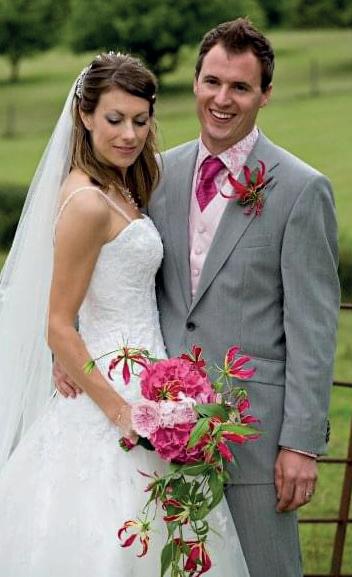
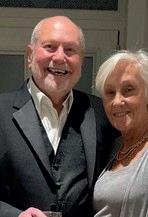

Mike Walker (1957-1964)
Suzanne Walker (Maynard scholar, 1959-1966)
Mike and Suzanne recently marked the milestone of sixty years since their first encounter. Despite Suzanne not attending Exeter School – then an all-boys institution – their connection deepened over time, eventually developing into marriage.
Mike shared a snippet of their story, “In February 1964 – so over 60 years ago – I met Suzanne Pengelly, a Maynard scholar, at a Saturday night dance at the university (which in those days was easy to gatecrash). We had a few months together before I joined the army and she went off to teacher training at Avery Hill. We kept in touch and when I returned to the UK in 1971, we got married and still are, with a daughter and two grandchildren.”
Did you meet your life partner at Exeter School? We would love to share your story. Please get in touch – alumni@exeterschool.org.uk.
Bunny and Andy met when they were just 12 and 13. After what seemed like an unsuccessful first date, Bunny was surprised when Andy soon asked her to be his girlfriend. More than 50 years later, the couple are travelling the world and at the time of writing, awaiting the arrival of their first grandchild.
Bunny shares a glimpse of how their love grew, “St Margaret’s boarders were invited to the Exeter School Christmas carol concert and Andy, together with Dave Evans (1971-1977) was serving drinks and mince pies. We started dating in May 1974 (14 and 15) on a blind date set up by Steve Hodder (1969-1976). Andy ignored me the entire time but did call me later in the week to ask me out!
“We landed in Wiltshire after university and secretarial college. Andy was partner/manager of a large GP practice for 25 years
Former Head Girl, Rebecca, and Martin, who was Deputy Head Boy, have announced their engagement after 11 years together, a relationship that began in Middle Fifth. Rebecca is currently an IMT2 (internal medicine training) doctor at King’s Mill Hospital in Mansfield, while Martin works as financial planning and analysis manager at the University of Loughborough.
and I worked in administration in independent schools. We have two grown-up children and our first grandchild on the way. We both completed Ten Tors again at the age of 55 and 56 doing the 55-mile route on the 55th Anniversary with other Old Exonians. We are now retired and have just completed (one and a half years) a big lap of Australia and aim to travel around Tasmania next year.”



We are lucky that alumnus Kevin White (1953-1961) has overseen the school archive for the past 50 years. With a connection to the school of over 70 years, extensive knowledge of both antiques and the history of Devon, and a strong network of OEs, Kevin is our go-to expert on all things related to the school and the county.
Not much surprises Kevin about the school’s history, so you can imagine his excitement when he discovered a photo of Princess Mary, Countess of Harewood amongst the items bequeathed by former Headmaster, John Launcelot Andrews (1927-1949). Kevin had been entirely unaware that royalty had ever visited Exeter School!
Princess Mary was the daughter of King George V and Queen Mary, sister to Edward VIII and George VI, and aunt to Queen Elizabeth II. The photograph discovered by Kevin shows Princess Mary speaking to Andrews and his wife on the field, where the Princess is likely inspecting the women of the Auxiliary Territorial Service. During the Second World War, she was Controller Commandant of the Auxiliary Territorial Service.
Princess Mary led a life dedicated to serving others and was a devoted wife to the Earl of Harewood, Henry or ‘Harry’ Lascelles. In 1918, when Mary turned 21, she sought her father’s permission to train and work as a paediatric nurse. Her training took place at Great Ormond Street Hospital, where she greatly impressed the matron on the Alexandra Ward, demonstrating no expectation of special treatment, despite her royal roots.
During World War I, Princess Mary understood that Christmas would be an especially difficult time for servicemen away from home, so she initiated a fundraising appeal to send them gifts. In a short period, over £162,000 was collected (equivalent to over £15 million today), and soldiers received brass tins filled with items such as tobacco and chocolate.
We imagine it was quite an honour for Princess Mary to visit the school.
Reference point - https:// thehistorypress.co.uk/article/ten things-you-may-not-know-about-princessmary/

Thank you to Bruce Stoneman (1953-1960) for setting this crossword.
Across
8.U.K. scheme (established in 1982), under which members of a community agree to take responsibility for keeping an eye on each other’s property, to prevent crime. (13,5)
11.across and 37. across Type of tea flavoured with bergamot. (4,4)
12.County town of Essex. (10)
13.across and 4. down Second wife of King Henry VIII, who was executed for committing adultery; mother of Queen Elizabeth I. (4,6)
14.Choose not to vote. (7)
16.Black and white ocean predator, commonly known as the “killer whale”. (4)
17.Preferred wood for making cricket bats. (6)
19.One of the Tropics; Earth-encircling imaginary line 23.5° north of the Equator. (6)
20.See 2. Down.
22.Smile-encouraging word from a photographer. (6)
23.Famed work item around which King Arthur and his knights used to congregate. (5,5)
25.A stingy person who hoards money and hates spending it; penny-pincher; miser. (10)
26.Downward-pointing spike of frozen water; winter eaves dropper. (6)
27.A diacritical mark (ç) placed below the letter c to indicate that it is pronounced as an s. (7)
28.Cue given to an actor when he/she has forgotten what comes next. (6)
30.Like some salads and coins. (6)
32.To injure a person so severely that part of their body is permanently damaged. (4)
33.French car company with a lion logo. (7)
35.Part of a plant or a wineglass. (4)
36.Of the same opinion. (4-6)
37.See 11. Across.
38.An elaborate ice cream sundae formed in layers and served in a tall conical glass, which is eaten with a distinctive long spoon. (13,5)
1.Turkey’s capital city. (6)
2.down and 20. across President of the U.S.A. between George H.W. Bush and George W. Bush. (4,7)
3.Tallest fence on the Grand National course, which marks the halfway point and is only jumped once. (3,5)
4.See 13. Across.
5.Piece of sports equipment that you jump up and down on, consisting of a piece of strong material joined by springs to a frame; bouncer’s place. (10)
6.Sounds Hellenic and personal but it’s a metaphor used to indicate a failure to understand something that’s said or written. (3,3,5,2,2)
7.Longest river in the British Isles. (7)
9.A phrase using words that include sounds which are similar to the noises the words refer to, such as “the bee buzzed in my ear”. (12)
10.Bereaved wife. (5)
15.Letters which the Post Office don’t treat as top priority; non-urgent items in the post. (6,5,4)
18.Sign of the Zodiac between Libra and Sagittarius. (7)
20.Skilled woodworker who specialises in the manufacture of high-quality furniture. (12)
21.A reminder of past events; souvenir; keepsake. (7)
22.down and 24. down An eliminating match between two football teams in Britain’s major knockout competition, with the winner progressing to the next round. (3,3)
24.See 22. Down.
25.Unit of measurement for advertising space. (6,4)
28.The small fee (for the service) paid by the purchaser when buying a U.K. postal order. (8)
29.Raft built and used by Norwegian explorer and writer Thor Heyerdahl in his 1947 expedition across the Pacific Ocean. (3-4)
31.Alien robot from Dr. Who that talks in a strange voice. (5)
33.Ursine mascot of the “Children in Need” charity. (6)
34.Hand method of dyeing (common in the Far East), where a fabric is bound tightly with string before immersion, so that some parts are more deeply coloured than others when unfastened. (3-3)
37.Increase in size or amount. (4)

Simon Lee is Head Groundsman at Exeter School, which he joined in February 2012. His daughter is currently a pupil in the junior school.
As Head Groundsman I am responsible for overseeing the running of the grounds department. There are three of us, plus Riley the dog (excellent at collecting sticks) and Bob the robot mower (not as affectionate as the dog, but far more efficient in his work). We maintain all the outside spaces at both the main school and pre-prep sites.
I am responsible for health and safety, planning of work, ordering of materials, dealing with contractors and equipment, servicing and repairs. I also work with the gardener and assistant groundsman in maintaining the sites and setting up for sport. One of the things I love about my job is how varied it is, so it’s difficult to run through a typical day - it can change with the weather, term or sport being played.
My day usually starts at 7.30am. The first aim for the grounds team is to get around the site and clear any leaves etc. before people start arriving. In the winter we may need to grit the paths as well. We often sweep the astroturf areas
“I know first-hand as a parent what the school provides for the children and families; I couldn’t wish for a better environment for my daughter to grow up in.”
first thing as well, as they are usually used from midmorning onwards. I’ll then typically check through what fixtures we have for the day or week and plan accordingly. In autumn and winter we might need to do some work in the tractors, maintain the turf surfaces or mark out the pitches, which is a lot of walking (it’s not unusual to walk over 10 miles in a day). Spring and summer will often involve working on the cricket squares, outfields and the gardens.
If we have any fixtures for the day, I will often be involved in setting up for these, marking out, setting up flags, boundary ropes, and preparing the surfaces.
The fact that our work is always on show can be both rewarding and stress inducing at times. It’s great when I feel on top of everything and the place is looking good, but on those occasions when something doesn’t quite go to plan, or I feel we aren’t quite where I want to be with something then it can be frustrating. I spent most of last summer fretting about getting the fertiliser on, but the weather just wasn’t on our side until the very last minute. Fortunately, it changed just in time and thanks to a great assistant groundsman, who was happy to put in a late shift, we were able to turn things around before our first fixture.
I’ve also really enjoyed being able to add wildflowers and trees at both sites over the last few years. There are lots of margins around the school that used to be kept very formal and it’s been great to be able to use these spaces for the benefit of wildlife, whilst also adding lots of colour in places.
In truth I’m very fortunate that I have a long list of things I enjoy about working here. I know first-hand as a parent what the school provides for the children and families; I couldn’t wish for a better environment for my daughter to grow up in or better people for her to be taught by. But I also know there is so much that goes on behind the scenes to allow the school to be what it is and provide that environment and education for her and all the children.
I feel very privileged to work here, looking after such fantastic grounds and working with such great people!

Nicholas Michael Smith OBE (1982-1986)
Following my time at Exeter School, I studied music at St. John’s College, Cambridge, after a gap year in the USA. The early 1990s were tough for musicians, still are, and after months of unsuccessful job applications, I joined Voluntary Service Overseas (VSO). This led to a TOEFL (Test of English as a Foreign Language) course in Norwich and a teaching post in Xianning, China, where I taught English. China back then was still “developing” and it’s hard to sum up the profoundness of the experience in a few words. My students were so poor that many of them could only afford to eat once a day. Xianning Teachers’ College was also so poor that running water was limited to an hour and a half each day, and the power went off at 8pm – strictly candles after that. No music making was possible, so to amuse myself, I started to teach myself Chinese. After three and a half years, I moved to Xiangfan University, then Wuhan Music Conservatory, where I developed postgraduate courses in music.
A colleague encouraged me to apply for a legal translation job at Baker & McKenzie. After training in
A day in the life
Hong Kong, I moved to Beijing, where I became part of the expatriate music scene but also sought connections in the local music community. I coached a winning piano duo, conducted the Baroque Chamber Chorus of Beijing, and founded Peking Sinfonietta and Beijing International Festival Chorus. In 2014, I left legal translation to focus entirely on music and remain in Beijing.
Since I no longer have to go to an office, I’ve become a late riser, so I tend not to get up until around 8.30am, unless I have to be somewhere for a rehearsal. If no rehearsal, I will make a pot of tea and read emails and other messages. Around 10.30am, once I feel human again, I’ll start to work. This could be learning scores or, if I’m trying to write music, looking over what I wrote the previous day to see if I still like it or not. Lunches, I tend to use for meetings or catching up with friends. If I’m not rehearsing, afternoons are given over to admin or perhaps listening to new music or looking at scores. Late afternoons and early evenings are for family (I have a four-year-old son), but once my son goes to bed, if I am composing, I start to work. Beijing is a pretty noisy place, and I find that ideas come much easier at night when things are calmer. If it’s going well, I will often work through until one or two in the morning.
I’m not entirely sure where my love for music came from. My parents apparently decided early on that I wouldn’t ever be a sporty type and so started me with piano lessons quite early. I also sang in a very good church choir until my voice broke, and choral music has always been one of my great loves. I remember that I started scribbling music quite young, but it wasn’t until Exeter School that it really went anywhere.
Simon Foxall (staff, 1983-2009) and Diana Draisey (staff, 1986-1989) created a music department that gave great space to students to follow their interests and passions and make mistakes in a forgiving and extraordinarily dynamic environment. The amount and quality of music making while I was at Exeter School was exceptional, and I am very grateful to have had that experience. Dr Simon Foxall (staff, 1983-2009) was kind enough to program some of my music; a great opportunity for someone still at school. Outside the music department, Ronald Impey (staff, 1983-2000) and Norman Shiel (staff, 1976-2004) were hugely influential also. Even here in Beijing I’ve met other Exeter School alumni, and that connection and shared experience has been wonderful.
“I remember that I started scribbling music quite young, but it wasn’t until Exeter School that it really went anywhere.”

We want more bright and talented children from our local area to have the opportunity to benefit from an Exeter School education. To make this vision a reality we need to award life-changing bursaries, means-tested financial awards, to deserving children. And to do this, we need your support.

My parents would not have been able to afford the fees at Exeter School if I had not received an assisted place. Sadly, these no longer exist but a bursary would have served a similar function in allowing me to attend for my sixth form.
I can see that the bursary fund will enable students from less well-off backgrounds to benefit from the educational opportunities available at Exeter School.
I would encourage those who can afford to, to donate to the fund and support their successors at the school.

Iwas fortunate to win a ‘free place’ scholarship paid by Exeter City Council to attend Exeter School in the 1970s - a place that I would not have attended otherwise. That gave me access to an excellent secondary education and a wider social world which provided a sound foundation for later life. Upon leaving school I attended university at Durham and Cardiff and then had a career as a chartered town planner, eventually retiring as Planning Policy Director at the City of London Corporation.
During the 1970s the many ‘free place’ and ‘assisted place’ pupils made the school more diverse socially and stronger intellectually, providing competition and challenge that was good for all pupils. I think the bursary fund today helps prepare pupils for their future in a diverse adult world.
A small but regular gift to the bursary fund makes a real difference when combined with similar gifts from like-minded former pupils. I also like to give promising local children from modest backgrounds the same opportunity to learn and grow that I was given.

John Jago
(1949-1956; staff, 1967-1996)
My father died when I was six. I, like so many others, would not have been able to come to Exeter School if I had not received a scholarship and a free place. I benefited immensely from my education here; I was also privileged to return as a teacher, and work with bright and keen pupils – and their parents – for many years. I give to the bursary fund because I want more children to have the opportunity to come to Exeter School and have an education that will set them up for life. And I also contribute with gratitude for the many happy years I spent working here.
“I benefited immensely from my education here.”
The bursary fund is important to me because it promotes diversity in our pupil community which can only be a good thing for all of our pupils. I also think it very clearly emphasises our commitment to Exeter as a city, being as accessible as possible to local young people. Having attended a state school myself, the benefits of an independent school experience are very clear to me. I am very proud of the education we provide here at Exeter School (both inside and outside of the classroom) and if the bursary fund means that more pupils can benefit from this then I think that makes it a hugely worthwhile thing to support.
Popescu parent of Exeter School pupil
Seeing my son grow from a little boy joining Exeter School to a wonderful young person today has been a long and wonderful journey, and I am so proud of him. I know that we made the right choice when we chose this school all that time ago. Maybe he would have achieved a great deal elsewhere but I know that Exeter School, and the huge amount of academic and extracurricular support it provides, enables its pupils to reach their maximum potential. So it just feels right to share and to help another wonderful young child to join this school and realise their dreams. I had the chance, at a donors’ lunch, to meet such a student not long ago. Hearing how much it meant to him to study for his A Levels here made me realise what an impact having the right help at the right time can have on a young life. When I think of the impact a bursary can have it makes my bursary donation really worth it.


Iam delighted to contribute to the bursary fund; my time at Exeter School certainly set me up for life and I hope to assist others to benefit from this opportunity. The all-round experience at school had me heading towards engineering and, combined with many fun activities as a cadet, inspired me to join the Royal Engineers for a full career. I urge others to help more of our young people achieve their own ambitions.
Make a gift and change a life. To find out how to make a gift and change a life contact Alice Holohan at asah@exeterschool.org.uk or 01392 458 940 or visit our website: bit. ly/MakeAGiftAndChangeALife


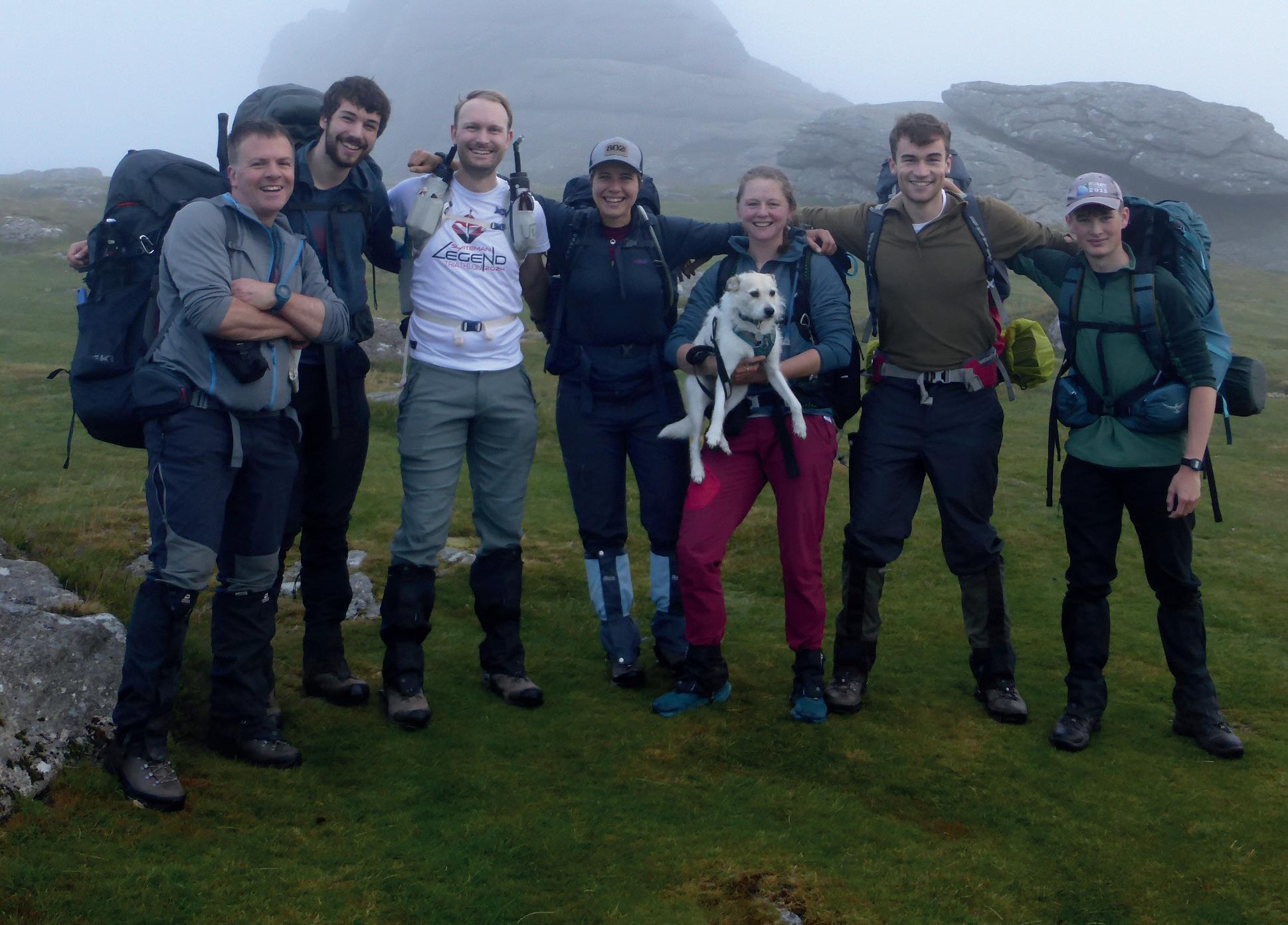
Ben Hall, Head of Ten Tors and maths teacher, set out to recreate a momentous expedition in the history of Ten Tors at Exeter School, inspired by alumnus Jon Lewis (1954-1962).
Where do ideas for adventures come from?
These days, Instagram perhaps, but conversations with our friends and family are still a great source of inspiration. Sometimes, however, a new possibility comes out the blue, setting us on the path to an unexpected and exciting undertaking.
In October 2023, Director of Development and Alumni Relations, Alice Holohan, contacted me to say there was a gentleman who wished to meet the Ten Tors manager. Jon Lewis (1954-1962) wanted to talk about his experiences of the
challenge, and to understand how it compared with the event today. I was keen to see him, as I had gathered that he had been part of Exeter School’s very fi rst participation in Ten Tors in 1961, walking 50 miles with his classmates from the CCF. Jon had a fantastic memory of the event, recalling it with great fondness and clarity. Furthermore, he had copies of key information that was handed out at the time, which he was willing to share with the school.
In contrast to the modern challenge, where teams start and fi nish at Okehampton, 1961’s teams started at Haytor and fi nished at Hexworthy. Rather than routes of 35, 45 and 55 miles being available, teams attempted a 35 or 50-mile route.
Most unusually of all, a list of ten tors was issued for teams to complete in any order they wished. Looking at an OS map with Jon, and examining the route his team had chosen, I was gripped with the feeling of excitement that comes when a new possibility presents itself. This new ‘challenge’ looked very well named – a demanding hike, often on less familiar parts of the Moor, with some tough ground underfoot. Towards the end of our meeting, I mentioned that the school should recreate this original route, and whilst Jon was enthusiastic, I was unsure whether he took me seriously or not.
The idea, however, had got under my skin, particularly as I saw it as a chance to bring together a team of alumni to walk the two-day route. By July, a group of five alumni, myself and one current pupil, were ready to tackle the vagaries of Dartmoor, united by their previous experience of having completed a Ten Tors route on an Exeter School team. A date was decided upon, to coincide with Jon’s presence in the country (he lives overseas), in the hope that he might be able to meet us at some stage on the route. On July 13 seven of us convened at the Haytor car park, ready to set off in the morning fog at 7am from the tor itself, officially the fi rst of the ten we were to visit. We were soon on our way, striding out at a good pace, heading between the tors on the eastern side of the Moor, aiming to cross the Dart at Newbridge. The weather set the pattern for the whole weekend, cloudy with sunny spells, mostly of which seemed to appear as we headed uphill! At Spitchwick the river looked tempting for a swim, but we needed to press on, following the long climb out of the valley to Holne. Here we turned along the road, leading to the spur of land holding Bench Tor, after 15km of walking. Snacks and photos followed, a routine that was established for the rest of the route.
From Bench Tor, we crossed into the wild southern part of Dartmoor, an area less familiar to recent Ten Tors participants. Paths of reasonable quality saw us well through for 6km, but these petered out, leaving us
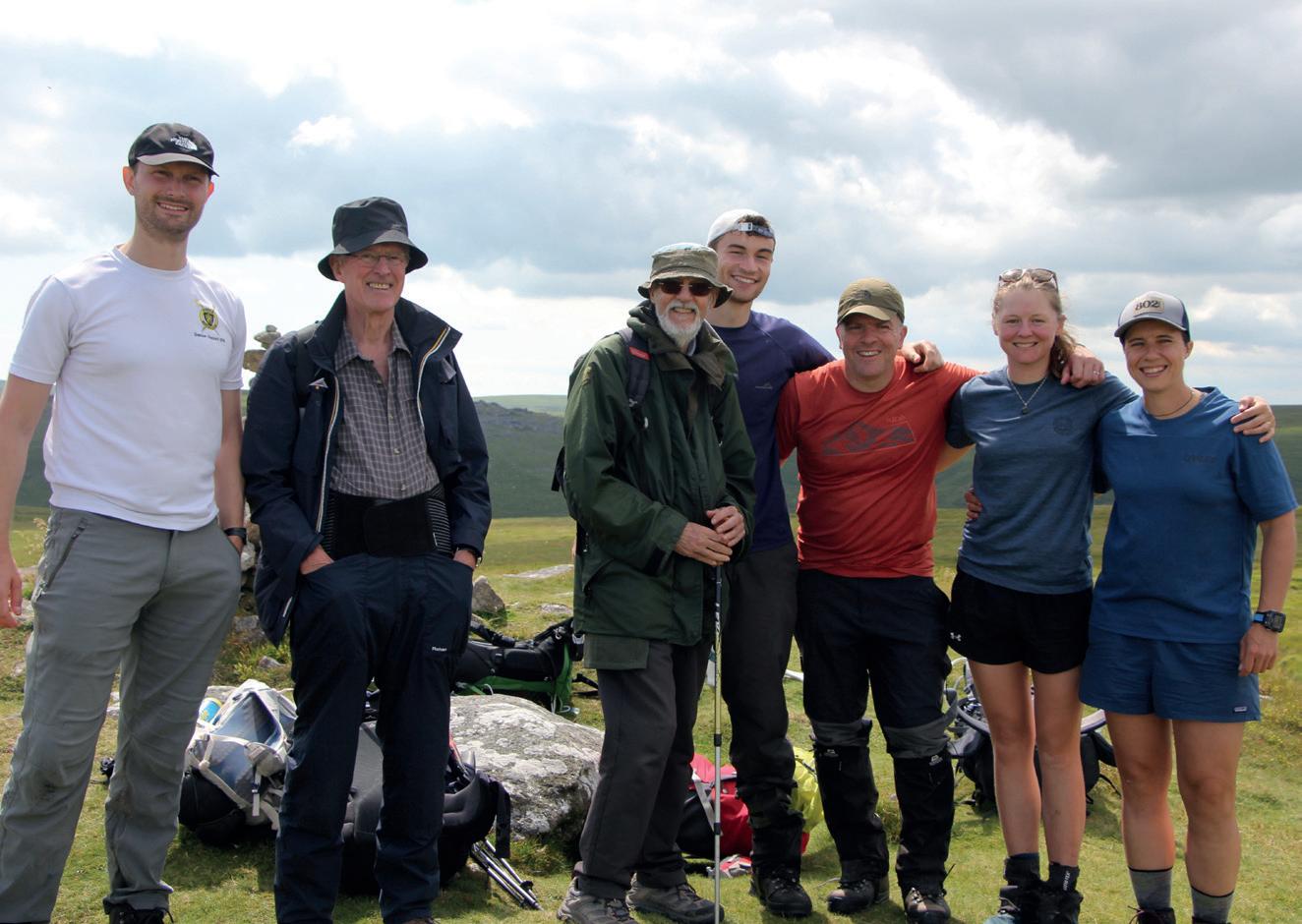
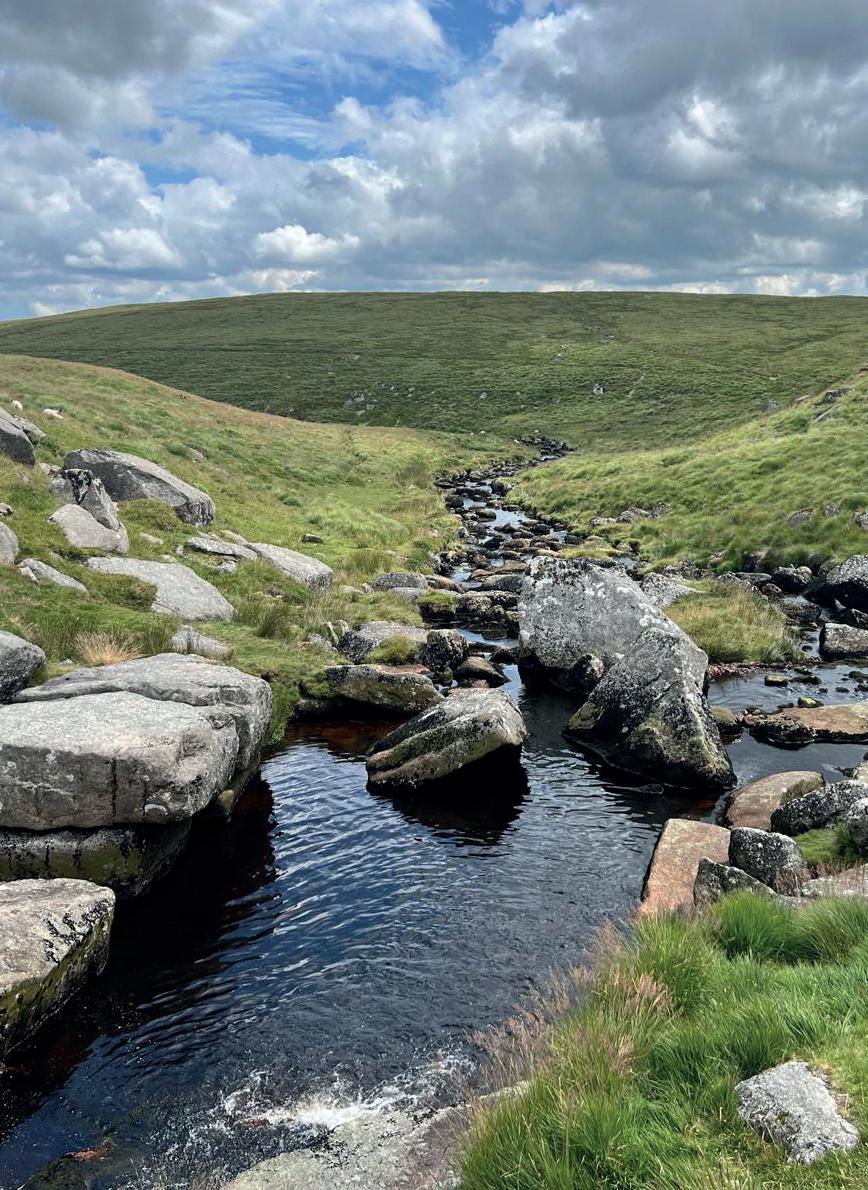
having to cross large areas of the infamous ‘elephant grass’ or ‘babies heads’, oversized tussocks of grass that provide challenging walking, especially with a full rucksack! Following the River Plym gave us some respite, but we were soon back in amongst undulating bog before reaching our third destination, Hen Tor. By now we had covered over 30km and were starting to feel the effects of a long day out on the hill. Happily, Gutter Tor was close by, and we had soon reached our fourth checkpoint, fording the Plym in bare feet, and passing by Ditsworthy House (of ‘War Horse’ fame).
A long slog up to Princetown followed thereafter, and the team found it hard going in the intermittent sun. Civilisation brought us relief in the shape of our support team however, who gave us an excuse for a long break and kindly supplied extra provisions and water. At this point, two of our party were struggling with previous injuries and decided to call it a day. This left a team of five to forge on for Saturday’s final 5km to Great Mis Tor, our campsite for the night and the fifth on our route. The evening turned out to be a glorious one and, with supper and a beautiful sunset to enjoy, we soon forgot our aching legs and settled in for a well-earned night’s sleep.
Sunday morning saw the team up before 6am, and the camp was soon busy with preparations for the day. There was just enough time to admire the low mist in the surrounding valleys as we loaded up with breakfast, before all were ready to face the challenge of day two. As we headed down to Walkham, the sun cleared the valleys, leaving Dartmoor looking glorious. Boulder hopping to cross a brook, we were delighted to see a kingfisher darting away from us, leaving us feeling that the day had started well.
The positive mood in the group continued as we progressed into the
heart of the north moor, passing the sixth checkpoint, Lynch Tor, on the way to the seventh, Fur Tor, often considered the most remote spot on Dartmoor. Progress was good, but the toughest part of the route lay ahead, both in terms of terrain and navigation. The dreaded elephant grass appeared again as we forged on to Lints Tor, our furthest point north, and number eight on our list.
Tor number nine then felt a long way across consistently difficult landscape, but whilst the 9km to Sittaford Tor took two and a half hours, we arrived knowing that the worst of the walk had been broken. Some distance remained, but the knowledge that we could stick mostly to good paths was a great fillip. A good rest followed, before we were ready to tackle the penultimate push of the day, onto Higher White Tor, before the final sweep into Hexworthy.
As we willed ourselves to leave Sittaford, Jon was putting his own expedition plans into action. With another member of the 1961 team, David Seward (1953-1961), he was set to head up to Higher White Tor from Two Bridges to meet the 2024 team of alumni. Joining them were their wives, and Alice Holohan. The timings worked perfectly, with the two versions of the team delighted to meet each other and discuss their experiences. Jon and David in particular, found it fascinating to think that we were covering the same ground they had, some 63 years ago. All that remained was a leg sapping two hours into Hexworthy, but with the first drink at the pub spurring us on, the team walked with steady determination to get the job done. It was then on to the Warren Inn for much needed sustenance and the chance to swap more stories with the squad of 1961.
United by their love of the great outdoors and their experiences of Ten Tors at school, the 2024 team had bonded quickly, and it was a pleasure to spend an expedition with them. It was a real privilege, however, to have members of the 1961 team meet us on the route, and to relate to their experiences as part of one of the original Exeter School Ten Tors teams.
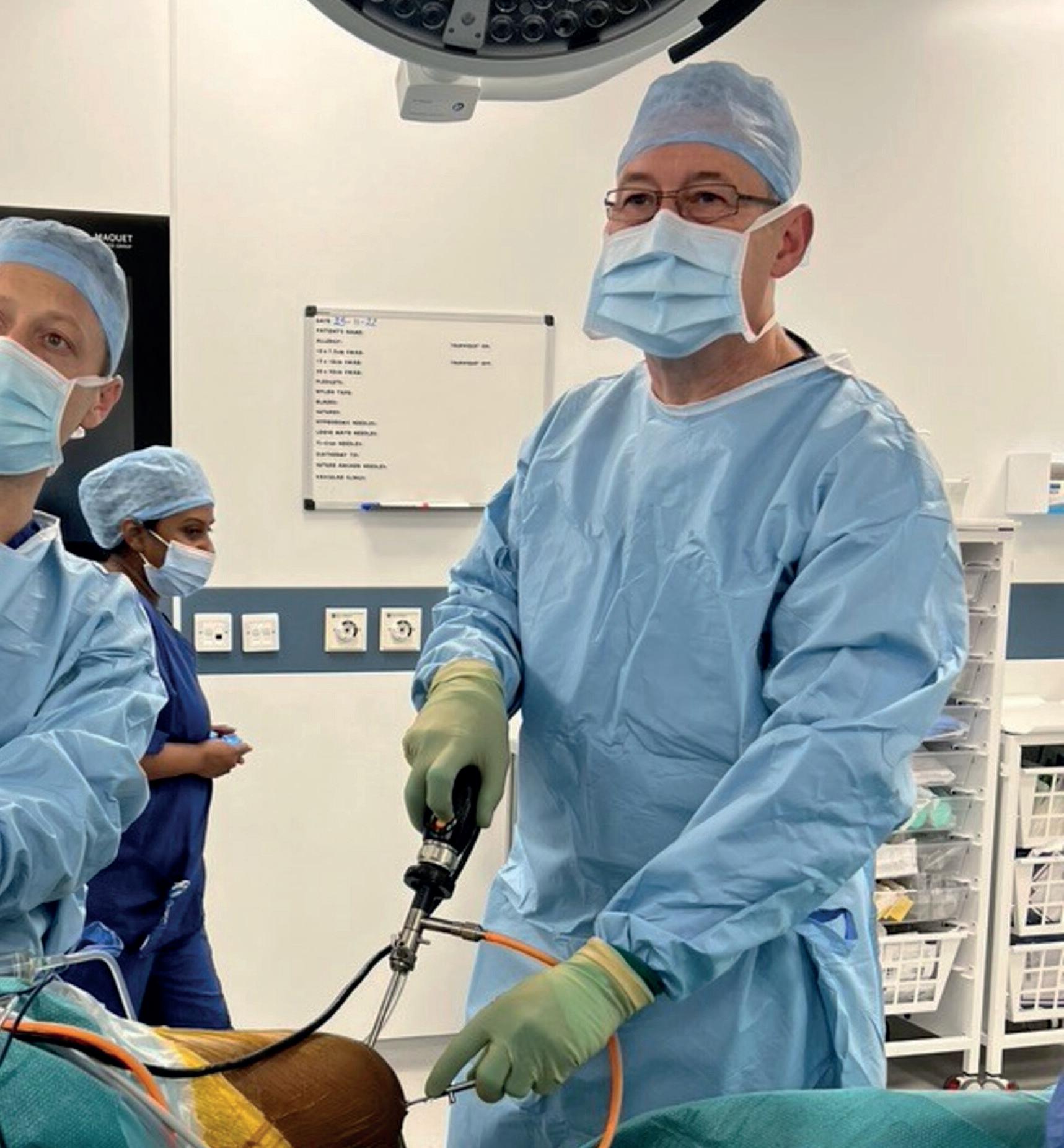
Andy Williams (1980-1982) shares his journey to becoming one of the country’s leading sports surgeons and co-founder of Fortius Clinic.
The 1633: Tell us about how you came to join Exeter School. Andy Williams: I grew up in Exminster, and went to the Teignmouth Grammar School. In the mid-70s it became a comprehensive school and that was disastrous for me; the quality of education fell away, which was very
sad. My parents decided I needed a decent education and they got the money together to send me to Exeter School – it wasn’t easy for them but the school changed my life, without question.
I was saved by the independent school system.
T1: Did you always know you wanted to pursue medicine?
AW: Until the age of 15, I thought I was going to be a builder like my father. But a biology teacher suggested that I could do medicine. My father gave me some great advice – if I wanted to do medicine, I must give it a go. I remember his words, “One day, when you’re on a building site and it’s pouring with rain, you’ll think to yourself why didn’t I do medicine.”
T1: What inspired you to focus on knee surgery specifically?
AW: I quickly realised that my future was going to lie in surgery; I really enjoyed teaching anatomy to medical students, and met some fantastic orthopaedic surgeons at King’s College Hospital – they had a great sense of humour and seemed to enjoy what they did. And I love sport, which meant I naturally gravitated towards orthopaedic surgery.
My first house job had been in orthopaedics, with a lovely man called Micheal Mowbray. As a knee surgeon, he had a profound influence on me. I trained in orthopaedics at the Royal National Orthopaedic Hospital, Stanmore, and then went to Australia from 1996 to 1997. I had an extraordinary experience in Brisbane – it was the best year of my life. I saw knee surgery performed to a level I had never witnessed before, and was undertaking a lot of sports surgery there myself. It taught me confidence in myself, until then I’d always felt like an imposter. I returned to the UK with a newfound mission and determination; I worked hard, opportunities came and I made the most of them.
T1: How did you come to co-found Fortius Clinic?
AW: My time in Australia taught me that we could do better back home! This sense was compounded by the ABC Fellowship which I was honoured to be awarded in 2000; it took me around the USA and I saw more excellent practice there. I came home in 2001 with an immense sense of urgency; it was obvious I had to set up my own practice.
I took a big leap with my colleague
John Lavelle - we handpicked a group of excellent people, and managed to put together the money we needed. We sold the business a couple of years ago and our parent company had the cash and confidence to buy us a hospital. We have three clinics around London, a surgical centre and now the hospital too. There were frustrations at the beginning, but I believe that if you follow your star you will eventually get the result you want.
T1: You’ve treated many Premier League footballers and Premiership rugby players. What are the unique challenges when treating professional athletes?
AW: Sports people stress their knees like nobody else. They experience issues that are rare in the general population, and when they get “ordinary” problems they can be greatly exaggerated. This means that treating them is really educational, and aids my ability to make diagnoses outside this field. The wonderful thing with athletes is that you get 100% follow up – the general population is harder to trace. Through research and a great deal of studying I’ve got my re-rupture rate for ACL reconstructions in professional footballers down to as
“Through research and a great deal of studying I’ve got my re-rupture rate for ACL reconstructions in professional footballers down to as low as 2%”
low as 2%, which I’m really pleased with.
T1: Are there any particularly memorable or challenging cases that stand out to you?
AW: There are many, and unfortunately you tend to remember the ones that went wrong. I’m an incredibly confident surgeon and I always expect good outcomes, but that doesn’t stop you feeling worried sick all the time. Bad things happen in our business; you have to be very brave and keep going. You do get the odd curve ball where things go wrong, for reasons that can’t be understood.
I performed a standard ACL reconstruction on a very high-level rugby player – one of the top three fly halves in the world at the time.

It went to bits, the blood supply to the outer part of the femur stopped, and that bit of bone started to die. This took place during the Covid-19 pandemic, which added another layer of difficulty to the situation. I put a PowerPoint together with all his scans and sent it to eight people around the world, who all agreed that my salvage surgery plan was the right way forwards. Four years on, he’s still playing international rugby. It was extremely stressful but I was very fortunate to have amazing people, including the player, on my side throughout.
T1: What does Exeter School mean to you?
AW: I was only there for two years and never felt part of the furniture. It wasn’t easy coming in and stealing a place in the cricket team from those who’d been there for years. Dennis Dyson (staff, 1960-1994) and my house master George Ayres (staff, 1961-1993) were tremendous and I was incredibly fond of them. And I am still friends with John Price (1980-1982), he also joined at 16. The education I received was second to none and helped me get into medical school. Exeter School changed my life.
T1: On a more personal note, what do you do outside of work?
AW: My work is all-consuming but I’m blessed to have an amazing wife and incredible family. There’s a lot of joy when we’re all at home together, and holidays are a riot!
OE grants of up to £250 are offered to Exonians pursuing unique projects that either support their studies, benefi t the community (locally, nationally, or internationally), or assist others. The 1633 spoke with two recent grant recipients to learn more about their endeavours.
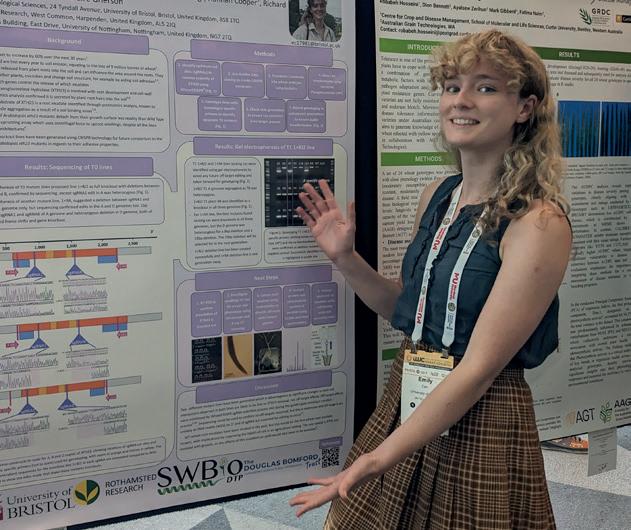
Emily Carr is currently in the third year of her PhD at the University of Bristol, where she is working to improve the sustainability of wheat production using genetics. Over the course of her project, she has developed her own set of gene editing techniques to help improve the structure of the soil they grow in, thus preventing soil erosion whilst maintaining a high yield. The OE grant helped enable Emily to present her work to the wider scientific community at the prestigious 3rd International Wheat Congress in Perth, Australia last summer.
Over the six days of the wheat congress, she attended talks on wheat genomics, evolution, breeding, nutrition and sources of stress, and gave her fi rst poster presentation at an international conference. The experience allowed her to broaden her knowledge in the field, whilst networking with international specialists in the field of wheat.
On the fi nal day of the conference, Emily attended a field trip to Intergrain, one of the leading cereal breeders in Australia. She visited the genomics facility and quality testing lab, where it was interesting to see how a lab can be combined with a bakery to test the quality of different varieties for desirable traits in bread and noodles. There was also a presentation on breeding logistics and a tour of the glasshouse, to see future elite varieties being crossed before being sent out to field trials. Attending the conference provided the opportunity to meet more international academics, and potential future employers. Emily got in touch to say, “I would like to thank Exeter School for their fi nancial support which enabled me to attend.”
Archie Gebbie (2007-2015), Samuel Boddington (2004-2015), Joshua Richards (2008-2015) and Max Brewer (2008-2015) – to support
‘Mission Ukraine’ by driving a 4x4 from London to Kyiv, which will be converted into an off-road
ambulance for evacuating injured soldiers from the front line.
Harry Hayter (2014-2019) –supporting his medical elective in Bolivia in the hospitals of Hospital de Ninos Mario Ortiz and Hospital San Jaun de Dios.


In the summer of 2024, Isabelle had the opportunity to take part in a research placement at the University of Cambridge, working within the Biochemical Engineering and Biotechnology Department. The project focused on the algorithmic description of systems and structural biology.
Isabelle shared,“As a summer research student, I carried out an independent project under the guidance of Dr. Sebastian Ahnert. The aim of my project was to study and classify the topologies of protein cages – complex 3D structures. I used tools like Python to analyse networks within these structures and compared them to Platonic, Archimedean, and Catalan solids. Software such as PyMol and PDB helped me visualise the structures and better understand their shape and patterns.” Isabelle went on to say,“Being part of a research group at the University of Cambridge was incredibly rewarding and will be instrumental in my future education. The OE grant played a crucial role in making this opportunity possible, covering essential travel expenses and contributing to overall costs while I was in Cambridge.”
This experience is a testament to how alumni support, like the OE grant, helps make valuable educational opportunities a reality.

Jon Lewis (1954-1962) shares an insight into what life at Exeter School was like in the 1950s.
When, with fi fty-nine other elevenyear olds, I started at Exeter School in September 1954 WWII had been over for less than ten years. Food rationing was only fi nally discontinued in that year, together with the requirement to carry national registration identity cards which had been introduced in 1939. It seems a long time ago.
Francis Kinnier Paul (staff, 19501965) had been Headmaster for


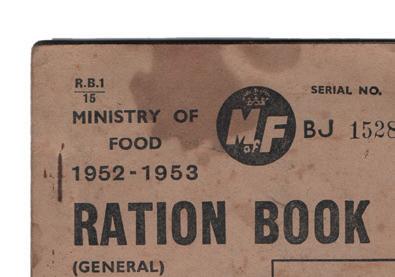
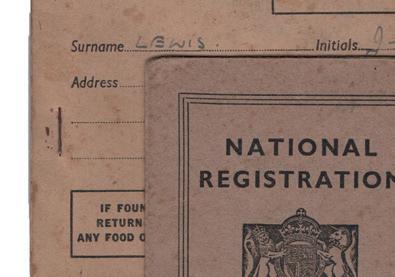

four years. The school accounts on his arrival were in deficit. By 1954 he had succeeded in balancing the books. No formal programme of austerity was imposed upon us, but there was no extravagance. All of us had been born during the war, so that was how it was.
In those days it was an all-boys school of course. There were around 375 of us in the main school in 1954, to increase to over 450 by the end of the decade.
For the winter and spring terms we wore grey trousers – shorts for the fi rst two years – and jackets with

white shirts and black ties. In the summer term it was a blue blazer instead of the grey jacket. Out of school everyone, except prefects, wore a school cap. School lunches were in two sittings. They were probably simple enough, but we were used to that. The two-sittings arrangement made for a long lunch hour. In the winter terms we played ‘one kick’ scoring points for placing kicks of varying difficulty over the rugby posts, negated if the other side caught them.
What we did not do was play football. We were a rugby school and ‘Fred’, as our Headmaster was irreverently known by staff and students alike, seemed able to spot any hint of round-ball activity from a great distance.
In the summer term we played cricket during the lunch break, serious stuff with test matches, umpires and score cards. For such lunchtime sporting activities we were

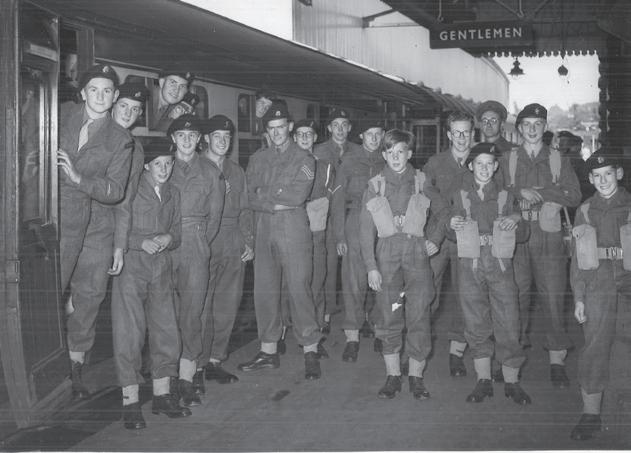
allowed to take off our jackets, but not ties.
From Monday to Friday we had seven lessons a day, four in the morning and three in the afternoon except when we had games twice a week. There was also school on Saturday mornings, and in the winter term we stayed at school on Saturday afternoons to support the First XV.
Every morning began with chapel. The chapel was not quite big enough to take all the school, so each day in rotation one house stayed out and had ‘house prayers’ under its house master. In those days all schoolrooms were within audible reach of the chapel bell which was rung to mark the beginning and end of lessons. One joined the CCF in the lower fifth. The CCF was something to which the Headmaster attached enormous importance. No one ever ‘got off’ corps. If you came to Exeter School you joined the CCF. The whole contingent must have been over three hundred, parading on Fridays. Many of our schoolmasters had served in the war, and a number of these re-donned their uniforms to bring their experience to the CCF.
Sport was a fundamental part of school life, the importance of the playing field, one often felt, was not far behind that of the classroom in the school’s priorities. The school calendar, issued every
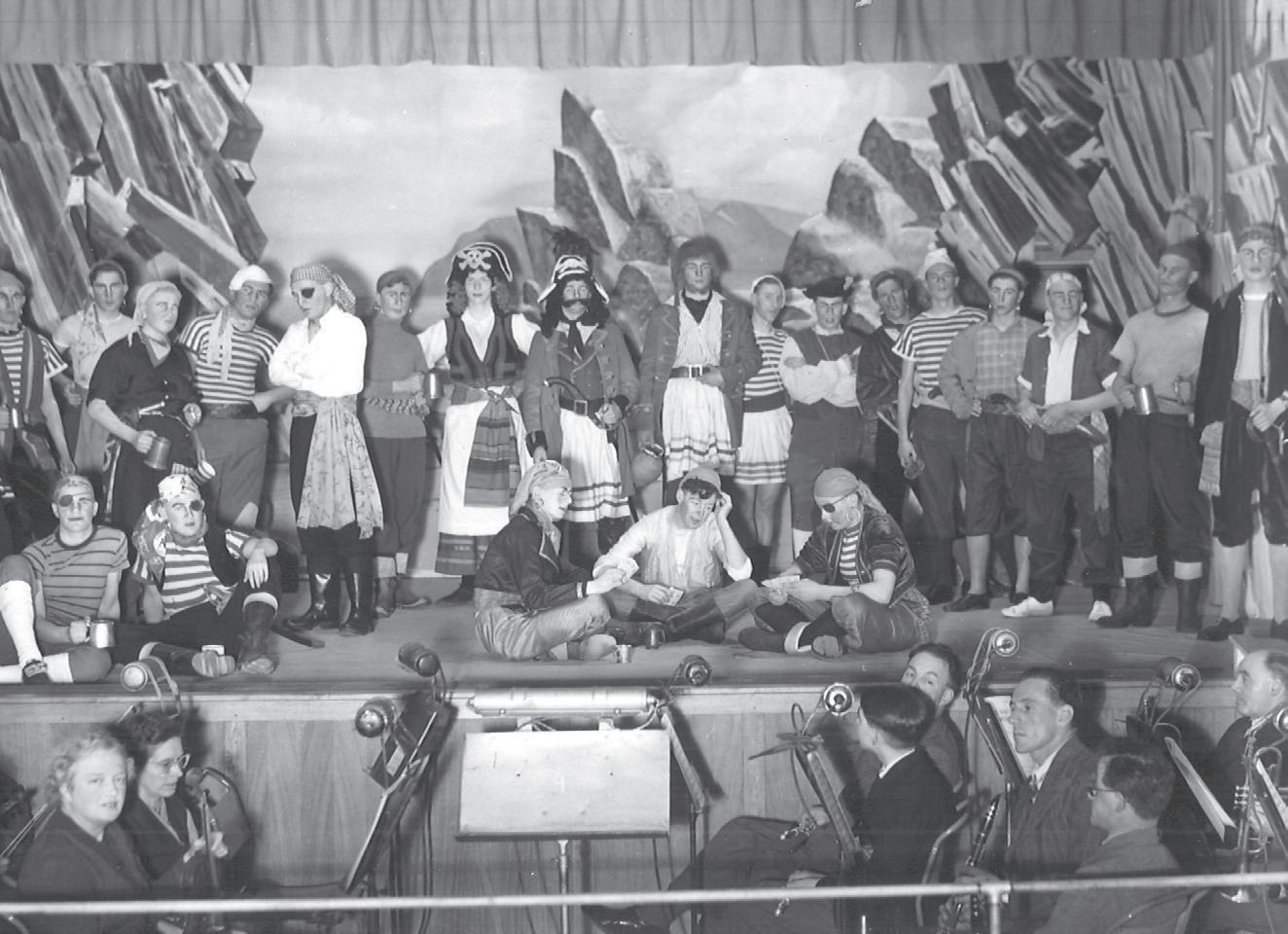
term, was dominated with the sports programme. For each of the three main sports there were First, Second and Third teams, and two ‘Colts’ teams. For the best players of each sport, at the discretion of the relevant captain and master-in-charge, colours were awarded. For these envied few, a colours badge replaced the standard maltese cross on their blazer pocket, and they were able to wear striped ties, a different one for each sport.
Evidence of diversifying interests at Exeter School during the 1950s is shown by the growth in the number of clubs and societies. In 1954 there were only six. Crossing club, the music club, the geographical society, the natural history society, the Christian fellowship and the young farmers club. By 1960 the number had grown to fourteen; one could now also join clubs or societies covering a wider range of subjects; art, history, models, transport, sailing, drama and stamp collecting.
Performances of Gilbert and Sullivan operas were major events during these years and involved large casts of singers and musicians from across the school. The female parts were played by younger boys with treble voices.
In the mid-1950s there were seven houses, School House (for the boarders), Drake, Raleigh, Buller,
Crossing, Daw and Goff. Milk (still provided by the government) was consumed by house in the morning break, an informal moment for members of the house to get together.
Each house was around sixty strong, and with only about ten new boys arriving each year the house masters and heads of house could get to know their charges very well. Indeed, the composition of the house was known to all its members, and older members would provide younger members with been-theredone-that counselling as they faced new challenges moving up the school.
The expression of house identity took its most visual form in the annual house matches. This was serious stuff; in addition to knock-out matches for the three major sports, there were also inter-house crosscountry, athletics and standards competitions. Each athletics discipline had set “standard” times or distances for juniors, middle school, and seniors. Boys could earn points for their house by meeting these standards during after-school attempts.
The main purpose of Exeter School then, as now, was to explore the intellectual potential of each student to its maximum. But the wide range of other available activities ensured a culture of full involvement, commitment, and responsibility.

Throughout the year, there are various opportunities to share your time and expertise with current pupils. The Alumni and Development office would be thrilled to welcome you back to Exeter School to help with the events below – we are deeply grateful for any help our alumni community can provide.
Here are a few key areas where your support would be greatly appreciated.
• Two events for the Upper Sixth in early September – gap year panel, where recent leavers return to share their gap year experiences, and I Wish I’d Known That, where former pupils discuss their transitions to university or the world of work, reflecting on the things they wish they’d considered during those stages.
• Lower Sixth futures conference in February/March – we ask the lower sixth what career areas they are interested in and invite alumni representing the top 12 choices to come back in and talk about their sector. For this event we look for
alumni who are established in their sector and who can offer a broad perspective to our pupils.
• Careers Convention in late January – our flagship careers event invites professionals from key industries to set up stalls and engage with our students.
• Our careers pathway adviser, Melanie Szender, is also organising industry-focused events. If you’d like to share your career experiences, we’d love to hear from you.
• Interview assistance at our upper sixth interview scheme event in October, as well as support for university and degree apprenticeship interviews.
• Mentoring and advice – the Alumni and Development office has seen an increasing number of career advice requests from sixth form pupils and recent leavers. Connecting them with alumni in relevant fields has proven incredibly valuable, whether through email, phone, or video calls. If you’re willing to offer your time in this way, please contact the Alumni and Development office to register your interest – your support is greatly appreciated!
• Ad hoc talks – with a busy academic schedule and numerous co-curricular activities, it’s wonderful to have alumni return to school for talks, whether in clubs, house meetings, or subject lessons, and it really benefits our pupils.
• Careers podcast and videos – we are looking for volunteers to share their career journey for our junior and senior school pupils, by answering a few questions about their career journey and their current role. If you’d be happy to take part, please email careers@exeterschool.org.uk.
• Speech Day – we are always interested in hearing from alumni who would be happy to deliver a short, inspiring message to our pupils on Speech Day.
• Exonian Lecture – The Exonian Lecture is a highlight of our alumni calendar, and we’d love to hear from those eager to share their work or achievements with a diverse audience for an hour, followed by a Q&A.
While we may not be able to accommodate every expression of interest, we warmly encourage you to share any ideas for the alumni community. Please also keep us updated on your career progress or areas of expertise - it’s incredibly valuable to our volunteering programme.
If you’d like to get involved, please don’t hesitate to get in touch –alumni@exeterschool.org.uk.

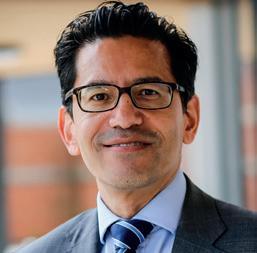
Exeter School’s sixth form centre plays a vital role in a pupil’s journey, providing a space for social development alongside a pupil’s academic growth. Assistant Head (sixth form), Luigi Chu, shares insights into the planning process and explains how the transformation of this beloved space has benefited all those who inhabit it.
The 1633: Tell us about your role at Exeter School.
Luigi Chu: I joined in September 2022 as Assistant Head, in charge of sixth form, from a background in boarding and day schools. I was keen to take on this sort of role as you have ownership of a distinct section of the school. I was the first of three new heads of section to be appointed under the new pastoral system.
T1: When you joined, at what stage was the redevelopment work?
LC: It hadn’t started at that point. The existing centre was functional; it was fit for purpose, but not very inspiring. But soon after I was in post the Bursar and the Head explained there were plans to invest in the sixth form and completely overhaul the centre. I was asked to come up with ideas for the space and consult with the pupils.
T1: What was the main goal behind the redevelopment, and do you feel this has been achieved?
LC: The brief from the Bursar was to create an inspiring space that feels grown up and special, and that would be transformational for the sixth form experience. We wanted our pupils who are preparing to go to university or into the workplace to feel like they’re in a forward-thinking and uplifting space. We added to the centre’s footprint with a significant extension, and have completely re-designed the layout, adding new rooms and areas to improve functionality. The space has exceeded our expectations.
The common room, situated at the core of the sixth form centre, is a multi-purpose space – it’s the main relaxation space but can also be used for presentations and talks. There is a 100-inch screen at one end and AV system so sound can be relayed across the whole centre.


T1: What are the key factors that have influenced the overall design and layout?
LC: We wanted to make better use of the space we had. A proper, new café was a must, and a bigger games room was a popular request. We also wanted to bring the study room into the heart of the centre and increase the size of the girls’ changing room. We were particularly conscious of visibility into all areas and made sure that lots of light could enhance the space.
Our 2024 leavers helped with design ideas, as part of their business and enterprise day brief. Some of those concepts have been incorporated by the architects, such
“The pupils feel important, and they know the school is invested in them.”
as the different zoned areas of the common room and the natural wood finishes in places.
T1: Are there any new features you haven’t yet mentioned?
LC: The new collaboration room, where sixth formers can study together, work on projects and hold meetings and two integrated staff offices. We’ve also gained a dedicated outdoor space on the paddock, which can be used all year round.
T1: How has the re-design improved the academic and social environment for pupils?
LC: It’s had a hugely positive impact, more than we could have hoped for.
The study room is sound-proofed, so pupils can work undisturbed but still feel part of the centre.
The collaboration room is being used a lot; for pupil projects, society or young entrepreneurs’ meetings, and the screens are used to analyse sporting footage. People are also happy to work in the main common room and café areas, like going into a coffee shop.
You see what everyone’s up to thanks to all the brilliant use of internal glass. The games room next to the offices can naturally get a bit animated at times, but because of the visibility within the centre we are able to passively monitor the pupils. It’s the same between the other areas and the staff offices; the fact pupils can see us is hopefully reassuring for them, too. They’re grown up enough not to need constant supervision.
The pupils feel important, and they know the school is invested in them. They appreciate that they are valued and have responded really positively to the new centre.
T1: Has the redevelopment influenced the sense of community amongst sixth form pupils and staff?
LC: The centre now feels much more together and integrated than it used to. The visibility between the different areas is key, and the spaces are being used as intended. It has the feel of a proper, vibrant hub.
T1: What’s the feedback from current pupils and parents?
LC: Extremely positive! When it first opened, everyone was bowled over and it’s great seeing the reaction from alumni when they return to visit. The wow factor is tremendous! Staff and parents say that it has the atmosphere of a university. It feels grown up, which is what we were going for.
We hope parents will see that it’s forward-thinking; the sixth form is a real destination, and it’s a fitting environment for pupils to experience their final two, important years at the school. Some pupils will have been with us since they were three years old, so to have two years in this fantastic centre is a lovely way to finish their journey at Exeter School.

This academic year, Exeter School has embraced a new system of pastoral care with the introduction of heads of each year group (Third Form to Upper Sixth). Criss-crossing this horizontal pastoral system, we have maintained a house structure through the merging of the previous ten houses in pairs, to produce five new houses; Acland, Crossing, Dowrich, Goff and Walker.
Each of these is named after a key benefactor to the school, with two women (Elizabeth Dowrich and Joan Crossing) joining their male colleagues, reflecting today’s co-educational pupil community.
The houses form the bedrock of the personal and character development of pupils, with many opportunities within house for the development of a strong vertical relationship between the year groups, leadership roles for the older pupils – as house captains for example –
and the development of inter-house rivalry through competitions helping to underpin a very evident house spirit within the school – all which is wonderful to see.
The school’s rich history is of
great importance, and in this article, we proudly reflect on the origins of houses Acland, Buller, Collins, Crossing, Daw, Dowrich, Drake, Goff, Raleigh, School House, Townsend, and Young, paying tribute to these as they remain embedded in the school story.
Acland House was established in the 1993/94 academic year, with former Head of Economics Roger Walker (staff, 1977-2014) serving as its first head of house. Named after the Acland family from Killerton, the house honoured the longstanding connection between the family and the school. From 1914 to 1937, Acland House, located opposite the school on Victoria Park Road, provided accommodation for younger boarders. It closed soon after the Andrews Wing was completed in 1933, which provided more space for boarders on its upper floors.
Announced in the winter of 1930 and coming to fruition the following March, Buller House was created in response to the school’s rapidly growing numbers, which made Raleigh and Drake houses increasingly unwieldy. It became the fourth house at the school and was named after General Sir Redvers Buller (1839-1908). Former mathematics teacher J Labey (staff, 1943-1954) was the first house master.
Collins House came into effect in the 1969/70 year and was named after the late Revd Prebendary R. L. Collins who was Chair of Governors from 1951 to 1968 and, as such, the basis of its symbol was the coat of arms of Prebendary Collins’ College
at Cambridge. The appointed house master was George Ayres (staff, 19611993), who remained in this post until the mid-eighties.
Crossing House was founded in the 1948/49 academic year, named in honour of Alderman and Lord Mayor of Exeter, Hugh Crossing. In 1624, it was his vision to provide education for disadvantaged boys in Exeter, a vision he made possible by acquiring a site near East Gate for the School. The creation of Crossing House was prompted by the expansion of the school. The July 1949 edition of The Exonian details how the preparatory department relocated to “Emsleigh,” adjacent to the school grounds. This move not only provided improved accommodation for the prep school but also offered flats for assistant masters. As a result, a new day house, Crossing, was formed, alongside a significant increase in staff.
A further increase in pupil numbers necessitated the creation of Daw House in the 1951/52 academic year, named in honour of Sir John Daw (1877-1883), who was first a pupil and then Chair of Governors. During his time as a pupil, the school moved to its present site at Victoria Park Road in 1881. Sir John’s long association with the school dates to his grandfather, who attended under the Headmaster Rev John Lemprière (staff, 1809-1818), and continued through his father and uncle.
Dowrich House was established in the 2018/19 academic year, named in honour of Elizabeth Dowrich (c. 1600), who donated the equivalent of £100,000 to support the school’s
development. She was not the first in her family to contribute; her father, Alderman Thomas Walker, made a significant legacy in 1629 to help establish what would become Exeter School. The first head of house was geography teacher and current Head of Third Form, Helen Sail (staff, 1990-1993 and 2008-present).
Drake House was founded in the 1919/1920 academic year, evolving from the former day house, A-K, which organised boys by surname. The house was named after the Elizabethan explorer Sir Francis Drake, who was born near Tavistock.
Goff House was established in the 1954/55 academic year in honour of alumnus, president of the OE Club, and benefactor, Sir Charles Goff (1876-1959). Although Sir Charles built his career as a stockbroker in London, he remained deeply connected to his Exeter roots. His generous donations to the school included prizes for oral French, the new Andrews Wing in 1933, the completion of the pavilion in 1953, and the tennis court.
Raleigh House was established in 1919, having previously been known as L-Z. The house is named after Sir Walter Raleigh, the Elizabethan explorer born in East Budleigh.
The first recorded house is School House, dating back to 1881 when the school relocated to Victoria Park Road. It served as the boarders’ house for 119 years, until boarding was discontinued in 2000. This part of the school now houses our magnificent two storey library.
Townsend House was founded in the 1982/83 academic year, with the first head of house being John Davidson (staff, 1976-2018). Townsend House is named after Wilfrid Townsend, who was an Old Exonian, Vice Chairman of the governing body, and a great benefactor of the school. His involvement in the school also included the opening of The Paul Building – a building which will be better known to the pupils as the lunch and assembly hall. He was also director of the printers James Townsend & Sons in Exeter.
Walker House was established in September 2024 in honour of Samuel Thomas Walker, who served as Mayor of Exeter twice, the second time in 1625. As the wealthiest merchant in Exeter at the time, he left £200 upon his death in 1628 to establish a city grammar school.
From 1997 to 1999, girls in the Third Form to Lower Fifth were members of Young House, aptly named after Miss A Young (staff, 1915-1925), the first female teacher at the school. A sincere ‘Appreciation’ in The Exonian of July 1925 records her departure after a full ten years in which Miss Young “enriched the intellectual life of the school”.

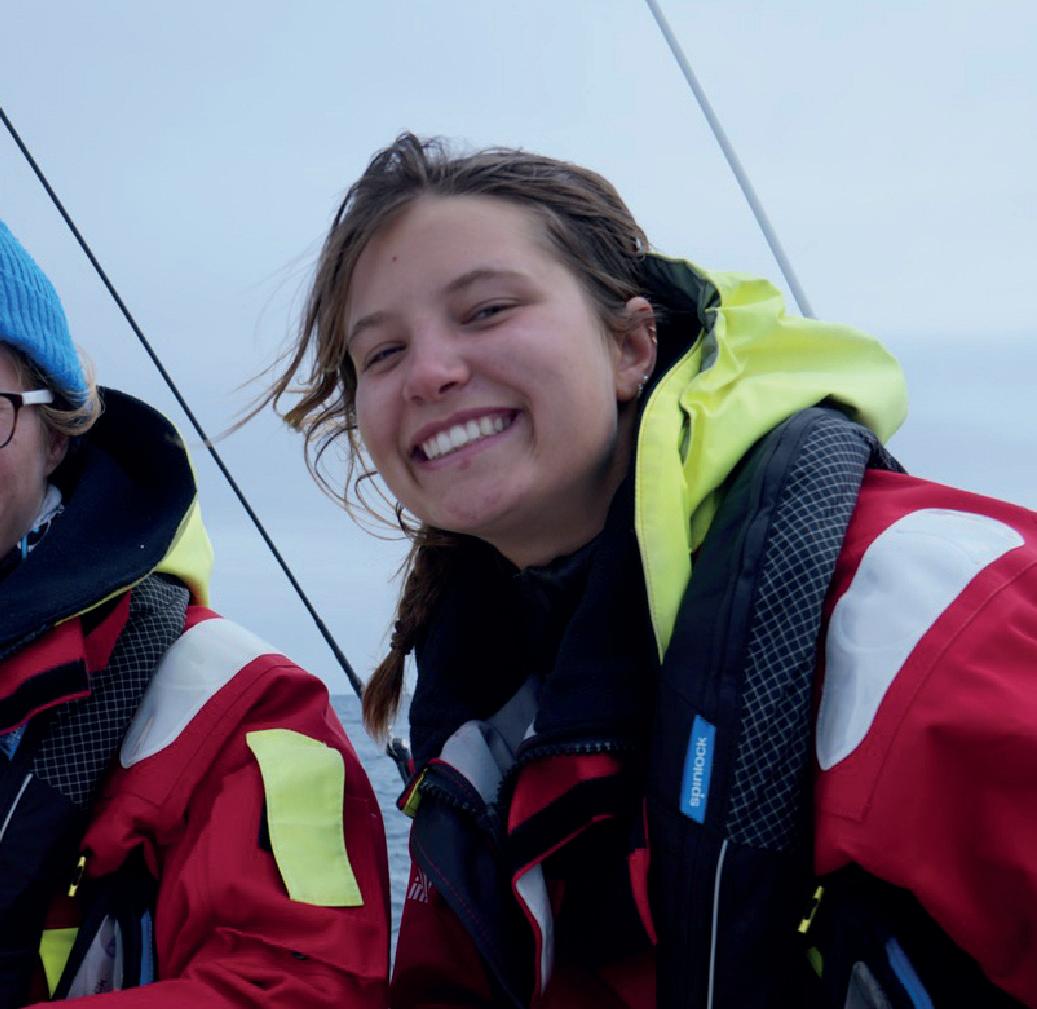
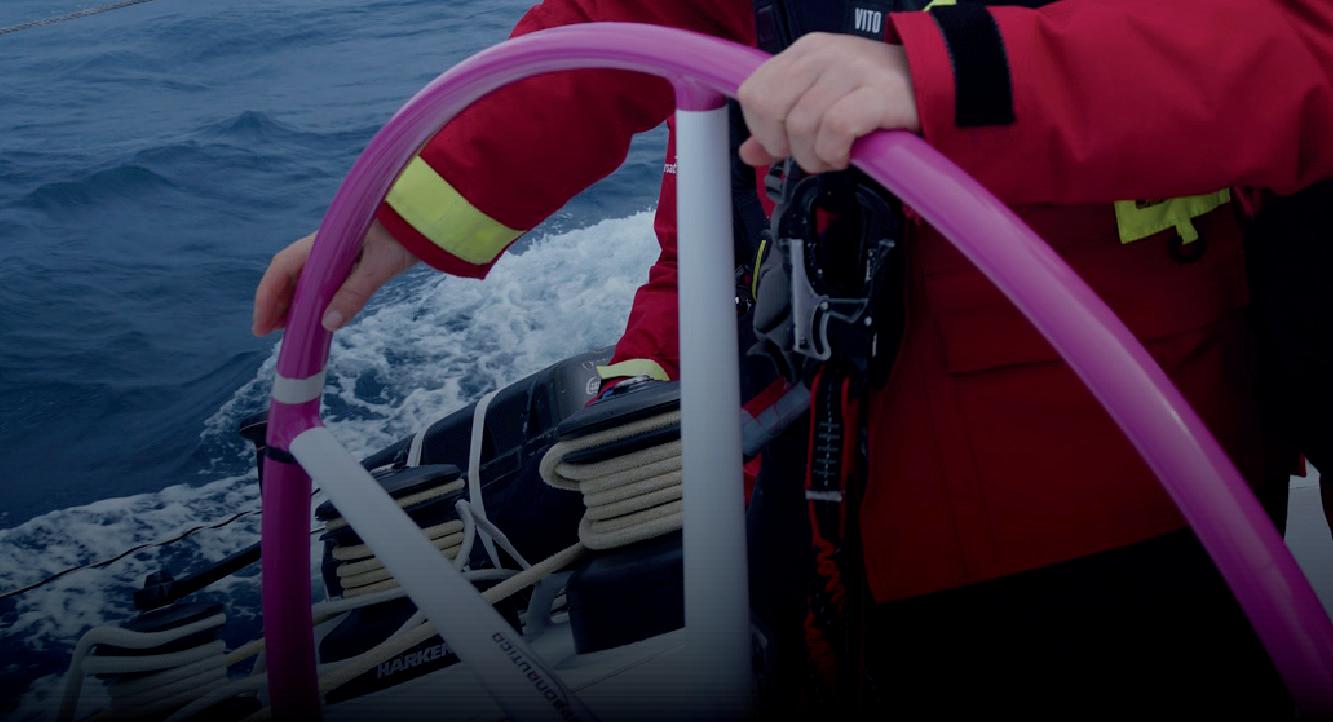

Exeter School has produced a number of alumni who are intrepid on the water. The 1633 caught up with just two of them.
Kate raced the yacht Maiden in the 2023 McIntyre Ocean Globe Race, a 27,000-mile challenge across four legs, including the Southern Ocean and the three Great Capes, and won with her all-female crew.
The 1633: Kate, where has life taken you since Exeter School?
Kate Ledgard: I left school in 2015 and took a gap year before studying medicine at The University of Sheffield. I subsequently worked as a doctor on the Isle of Wight before I was offered the amazing opportunity to sail around the world. I’m now back at work in the NHS in Basingstoke.
T1: How did you become involved in The Maiden Factor?
KL: Growing up, I sailed a lot with my parents and then continued sailing during university, mainly team racing in dinghies. I commuted from Sheffield to the Solent every weekend to take part in crossChannel races, completing my fi rst Fastnet race in 2019. During that time, I was selected for the British Keelboat Academy. My coach then recommended me as a potential team member for Maiden
T1: Tell us about the race.
KL: Maiden was fi rst raced around the world with an all-female crew in the 1989/90 Whitbread Round the World Race, skippered by Tracey Edwards. This was the 50th

anniversary of the 1973 Whitbread race. We became the fi rst all-female crew to win, and also the fi rst crewed British fl agged boat to win an around the world yacht race.
It was a retro race – we navigated by sextant using the sun, stars and moon. We could send three short texts a day and had a weekly satellite call to the race organisers. We contacted passing ships for weather updates and used them to gain a more accurate position.
T1: What proved to be the greatest challenge?
KL: Your shift pattern is four hours on, four hours off. When you are on shift as a watch leader, you’re responsible for trimming the sails, steering, and deciding which course to follow. During your off watch you must eat, change, get dry, get ready for bed, sleep, get out of bed and do any cleaning.
Another major challenge was keeping motivation up, especially during the light winds of the last leg.
T1: At what point did you know you’d won?
KL: When we left Uruguay, we needed to be five days ahead of

T1: Since leaving Exeter School, where has life taken you?
Rebecca Glover: I fi nished school in 2013 and went to study medicine at the University of Sheffield. I was inspired to embark on a military career after speaking to Col Neil, (the Army Careers Advisor at school). I was awarded an army sixth form scholarship and later achieving a university and medical bursary. Once in Sheffield, I trained with the university officer training corps, before commissioning into the Reserves in 2017.
a really important part of sailing. Ali Marsh (staff, 2001-2022) was a great support, and Matt Corke (staff, 2010-2014) was a brilliant geography teacher, who led fantastic kayaking trips.
T1: What does it mean to be an alumna of Exeter School?

a on the boat when we got




Triana and we had officially

the French boat Triana to win overall. For most of the fi nal leg we didn’t know where they were, but worryingly we knew we had already missed out on winning our class that leg. When we arrived in Cowes at the fi nish, we were told the news that they were approximately five days behind us. We spent the next week anxiously checking the forecast, the wind was getting lighter, giving us more of a chance. We were working on the boat when we got the phone call from race management that hadn’t arrived in time, and we had officially won – celebrations started immediately.


After graduating in 2018, I worked at the Royal Centre for Defence Medicine, QE Hospital Birmingham, which is an NHS hospital with a heavy military presence. In 2020, I returned to the Royal Military Academy Sandhurst for my regular officer commission, before completing six months military medical training at the centre for the Army Medical Services. There, we learnt how to utilise our clinical knowledge in the varied pre-hospital environments we work in in the army.
I might not have got into medical school had it not been for my time
KL: I know it was a great grounding for everything I’ve done since, and I might not have got into medical school had it not been for my time at Exeter School. It has given me the determination and confidence to always push


I then moved into my current role as a general duties medical officer. Day to day, I work in a military medical centre in the UK but deploy regularly to provide medical support to army exercises and operations both in the UK and worldwide. Most recently, I was selected to row across the Atlantic, in the fi rst allfemale army team – Force Atlantic.
confidence to always push myself.
T1: How did you get involved with World’s Toughest Row?

Are there any teachers


T1: Are there any teachers at Exeter School that were particularly important to you?




KL: My physics teachers Graham Bone (staff, 2003-present) and Mark Schramm (staff, 2011-present) stand out for me; physics is
teachers Graham




At the time of writing, Rebecca was preparing to head to sea – in a smaller vessel and with just three other female crew members.




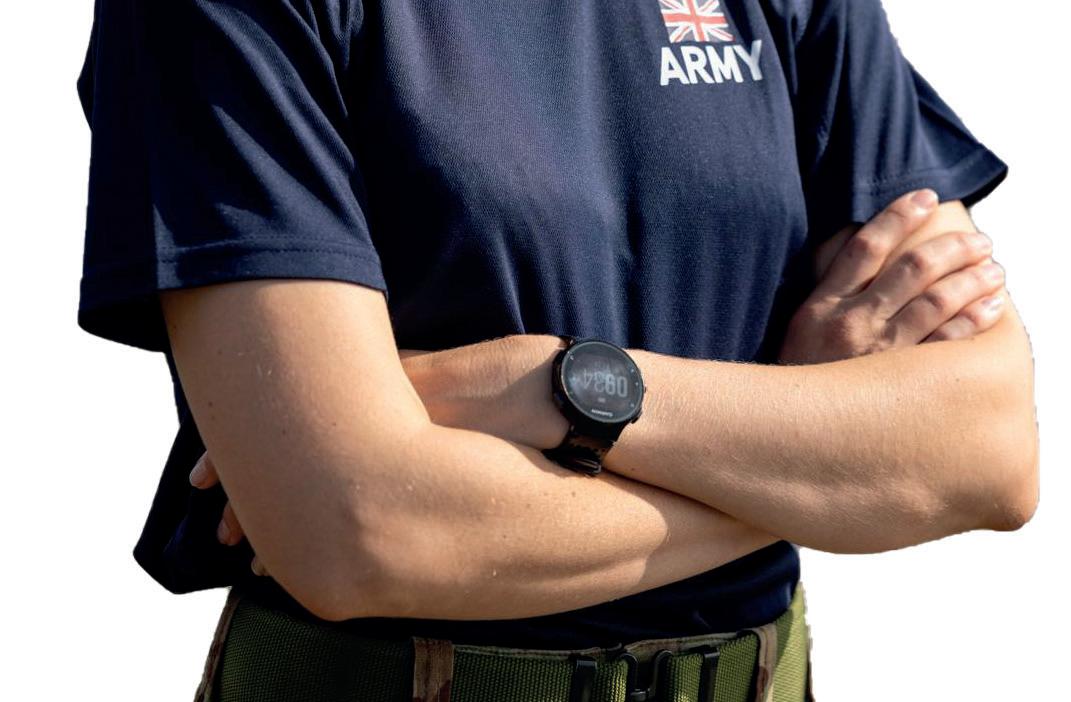
RG: The process started about three years ago – I had just fi nished Sandhurst and I saw a poster saying, “four soldiers, four women, one ocean”, looking for a team to take on the 3,000 mile journey from La Gomera to Antigua. 120 women applied from across the regular and reserve army, which led to an 18-month selection pathway, resulting in the fi nal four rowers. And then the work began! We aim to train six times a week but owing to various other commitments, I am lucky if I manage four! We have mandated courses, technical training and time on the water, as well as

aspects of the campaign no one tells you about – seeking sponsorship, charity events, promotion and endless decision making, from updating our Wills to deciding which colour flasks we should have!
T1: What will prove to be the greatest challenge on the journey?
RG: The physical challenge will be hugely demanding, but I think finding the psychological strength required to complete such a challenge will be the hardest aspect. The boat is 8.5-metres long, we only have solar power, the row is unsupported, and the crossing is due to take us about six weeks; we will row two hours on, two hours off for 24 hours a day, experiencing sea conditions with up to 30 ft waves. This will be a huge test of mental resilience.
T1: Why did you choose to support The Girls’ Network?
RG: The Girls’ Network is a fantastic mentoring charity, founded by two teachers in London who felt that girls from the least privileged backgrounds

were offered fewer opportunities and had less exposure to some areas of industry and fewer role models. The Girl’s Network pair girls aged 14-19 with women across all areas of society to give them support, guidance and mentorship.
T1: Can you recall any teachers who were particularly important to you?
RG: I had many fantastic teachers and have very fond memories of school. I did French A Level as respite from maths, biology and chemistry and Mike Wilcock (staff, 1986-2020) was the most enthusiastic teacher. The energy he brought to
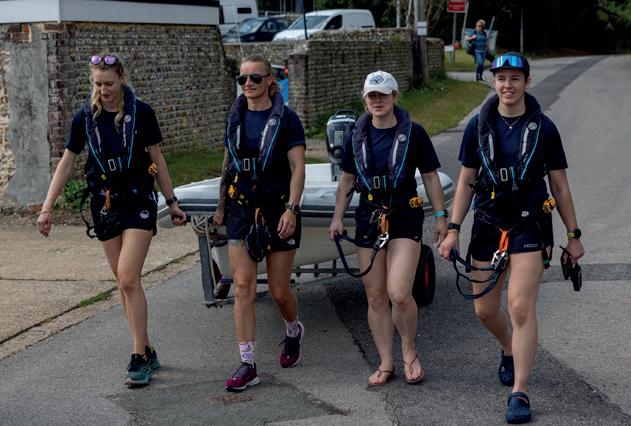
the classroom was second to none. My sister went on to study French at university and I can guarantee she would say the same!
T1: What does it mean to be an alumna of Exeter School?
RG: I remember hearing from alumni whilst I was a pupil and being inspired by what they had achieved; I hope to give back to future generations like many have for me. The military is like one big family, and I think Exeter School is like a family, too – some of my closest friends are those friendships made at Exeter School.
It’s been a pleasure reconnecting with so many alumni this academic year, both on campus and further afield. You can find open event dates below and on the school website. Alumni events can be found at exeterschool.org.uk/alumni-events.


Whole school open morning
Saturday 27 September 2025
Si xth form open evening
Thursday 6 November 2025
Whole school open morning
Friday 23 January 2026
Exeter Pre-prep open morning
Wednesday 25 February 2026



Summer open evening
Thursday 7 May 2026
Exeter Pre-prep open morning
Thursday 4 June 2026
Whole school open morning
Wednesday 17 June 2026
Please get in touch with Liz Williams, Director of External Relations, to fi nd out about our open events –esw@exeterschool.org.uk.
We’re excited to share the latest news from across the Exonian community. Whether you left school recently or some time ago – please continue to keep us updated with your activities, achievements and milestones.

Adam Dodd, who was awarded a bursary to attend Exeter School, competed on BBC2’s University Challenge last year, representing Manchester against Imperial College London. Currently studying

medicine at the University of Manchester, Adam is thankful for his time at Exeter School, where he became a senior prefect, ran the history society, joined the MedSoc and went abroad for the fi rst time. As he puts it, “There were opportunities previously unavailable to me, and I absolutely loved taking part in them.”
“I took maths, further maths and economics at A Level and took computing at AS Level. I’ve since gone on to study maths at the University of Nottingham, getting a fi rst-class honours, then continuing my studies by taking a masters in computational neuroscience, cognition and AI where I scored a distinction, the highest in school. I spent nearly two years working as a software engineer at Dstl before recently joining an AI startup called Blaize.”
“After Exeter School I did an imaging science degree at the University of Westminster at Harrow. I got my fi rst job in visual effects at a company called Cinesite (at the time part of Kodak) in Soho, London. Initially this was doing data management (my fi rst task was backing up the fi rst Harry Potter movie) before moving into the 3D department a couple of years later. My fi rst credit I actually worked on was The League of Extraordinary Gentlemen where Venice is getting destroyed. I worked on most of the Harry Potter movies, Sahara (the solar plant) and Hitchhiker’s Guide to the Galaxy. I was there for about ten years.
“I then got a job working in Sydney, Australia working on Happy Feet 2 as a technical director (essentially a support programmer) before moving to Animal Logic for the fi rst Lego movie – and all the subsequent Lego movies. I have been here ten years. Our most recent movie was Leo – available on Netfl ix.




Animal Logic is now part of Netfl ix


“I have two boys – the older one is currently doing HSCs (the equivalent of A Levels) and wants to do programming. We have no idea what the younger one wants to










Following Exeter School, Emily studied rural land management at the Royal Agricultural University, graduating in 2021. Emily joined the Savills graduate scheme, initially working in rural estate management before moving to London with their cross-border valuation team.
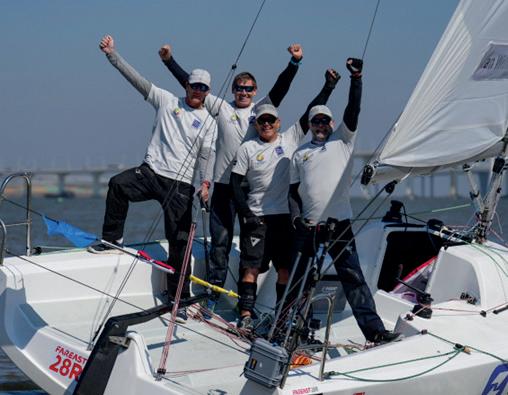
Ian Williams and his crew – Richard Sydenham, Jon Gundersen, and Gerry Mitchell – were victorious in the 2025 Macao Match Cup, the opening race of the 2025 World Match Racing Tour. The event, part of the Macao International Regatta, saw competitors sail FarEast 28R match racing boats, demonstrating exceptional skill and teamwork.
school governor)
Martin, who gives talks on many subjects, is an expert on the life of Andrea Angel (1890-1896) – a former pupil who died in 1917 after an explosion in a London munitions factory, where he was working. Angel helped many people to safety during the blaze and was posthumously awarded the prestigious silver Edward Medal for his bravery. Martin got in touch to say, “My current talks are about Charles Dodgson (better known by his pen name Lewis Carroll), English polymath Robert Hooke and clockmaker Thomas Tompion – the latter two were recently given to the Hooke Society on the Isle of Wight and to the Clockmakers of Abingdon.”
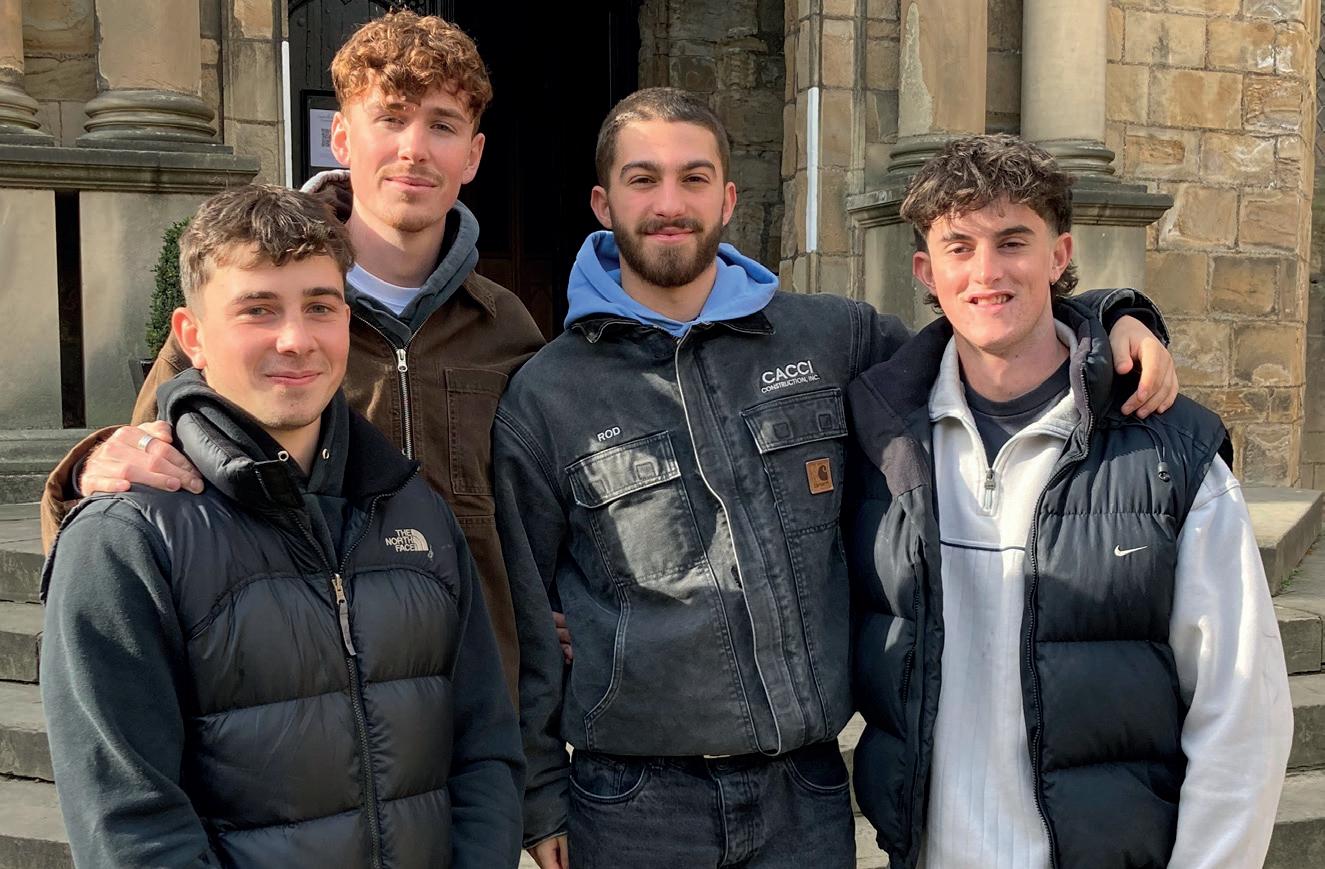
Blaise Class-Lasdun (2014-2021), Gus Harvey (2012-2021), Casper Kelly (2011-2021) and Caspar May (2016-2021)
This tight-knit group of friends, who share countless memories from their days at Exeter School, have been making their mark at Durham University for the past three years and will soon be donning their caps and gowns. Gus has been studying philosophy, politics and economics, while Caspar has focused on accounting. Blaise and Casper are just a step away from fi nishing their economics degrees.

Last year, Mike Harris, son of former chemistry teacher Steve Harris (staff, 1983-2010) and learning support teacher and housemistress, Gill Harris (staff, 1986-2007), won the British National Racketball Singles Championship for the seventh consecutive year. Mike, now in charge of UK racketball, says his passion for the sport grew thanks to former teacher John Poustie (staff, 1990-2013).
Civil engineer Brittany Harris (Mike’s sister and Steve and Gill’s daughter) won the Green Business of the Year Award at the West Country Women Awards for her company, Qualis Flow, which she founded in 2018, to help construction teams work more efficiently and responsibly. She’s also the youngest woman to be named an ICE Fellow, marking another impressive milestone in her career.
“I completed a physics degree at Bristol, took a gap year, and am now preparing for my fi nal exams to qualify as an accountant. Assuming I pass, after completing my qualification, I aim to work in corporate strategy, with the ultimate goal of becoming a CEO or CFO of a tech startup.”

Tom is currently in his fourth year studying medicine at Cardiff University, playing for the men’s 1st XV and serving on the Cardiff anaesthetic, perioperative and intensive care society committee. Although uncertain about his career during A Levels, Tom chose medicine and is now considering anaesthetics or emergency medicine, with plans to apply as a medical officer in the military during his foundation training.

Andy Scott (1963-1971)
Andy, who lives in America, has retired after more than 40 years working on the retail side of the oil industry. He says, “I’m looking forward to playing more bad golf and taking our RV to new places in the US.”
Helen, an RAF Reservist in logistics, recently won the ‘double’ in both downhill and enduro at the RAF Gravity Mountain Biking Championships. Reflecting on the event, she said, “It was some of the toughest riding I’d done, both because of how technical the courses were, and the distance covered.” She also noted, “We were lucky with the weather – it stayed dry for the whole event, which was nothing short of a miracle.” The events were held at Golfie and Innerleithen in Scotland.

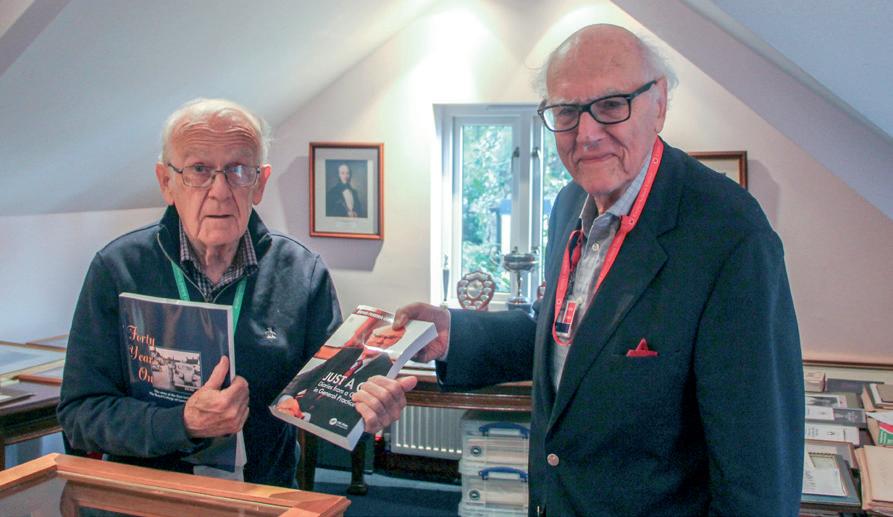
OBE FRCP FRCGP FMedSci (1943-1954)
Last year, Sir Denis visited the Exonian Centre to donate copies of his memoir, Just a GP: Diaries from a Career in General Practice, to the archive and met with archivist Kevin White (1953-1961). The autobiography provides a rare glimpse into the life and career of a highly esteemed former president of the Royal College of General Practitioners.








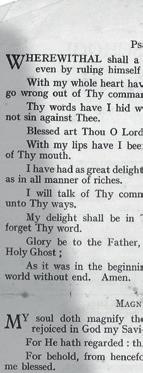



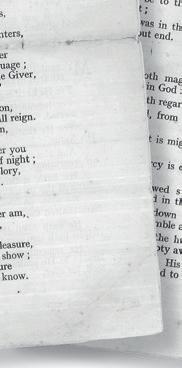

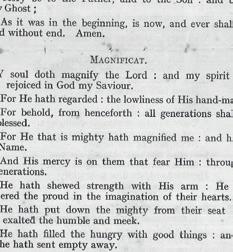




Raleigh House (1943-1949) 1931-2024
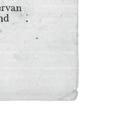
Jack’s daughter, Anne Hervé, kindly mailed a Founders’ Day order of service dating from 12 June, 1945, which she found amongst her father’s belongings, with the following note, “He was a proud pupil of Exeter School, and kept in touch with many of his friends throughout his life.”
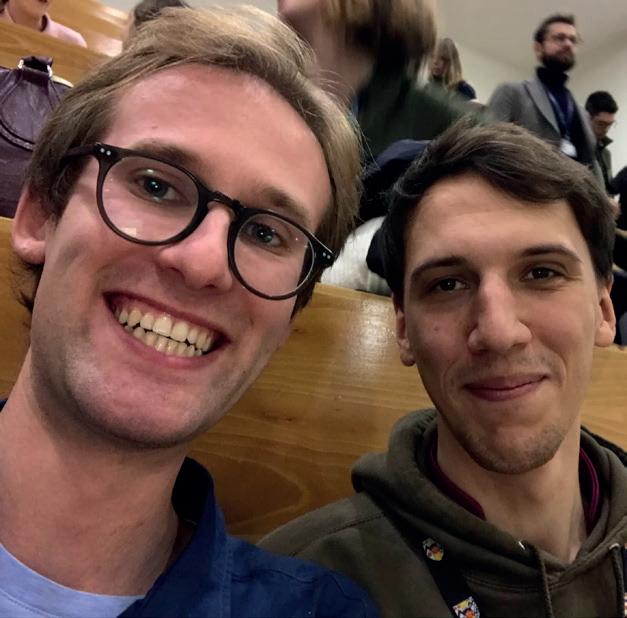
Josh Grier (2013-2020) and Sam Mullan (2015-2020)
Last year, Josh and Sam seized the chance to snap a selfie at the Oxford Medical Sciences Division welcome event for graduates. Josh is currently at the EPSRC Centre for Doctoral Training in Healthcare Data Science, while Sam is pursuing a DPhil in physiology, anatomy, and genetics.

Mark celebrated his 53rd birthday in the beautiful Lake District, close to his home, with family. He reflects, “A love for the hills was kindled at school and has been enjoyed ever since.”

“Silversmith, glass engraver, escapee to warmer climes. After three years in France trying to keep body and soul together as an artist, I was swept away to a life at sea sailing out to Tahiti and back. San Francisco became home until the 80s when romance took me to Australia via an Indian ashram.
“I discovered my métier as a small business entrepreneur in Sydney and then Adelaide where I have lived ever since. Years spent building our home in our spare time and financial success creating and selling various enterprises meant retirement at the age of 39.
“Time to pursue the voice of my heart, back into sculpting,
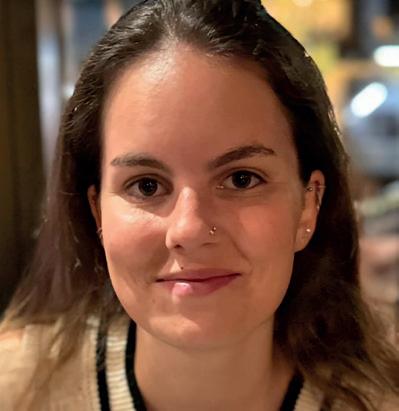
boatbuilding, conservation and community. Losing my daughter and partner, recovering, and starting again. A new family, two girls to blend with a beautiful boy born in 2008, home dad, a tilt at politics and a three-year sabbatical on the European canals and seas before covid arrived. Now back working with Greenpeace Australia Pacific, Organic Consumers Association of Australia and Whale and Dolphin Conservation Australasia. Taking care of the planet. Carbon neutral, lots of solar, veggie garden and a small forest.
“I remain the funny, lazy kid with clunky social skills who was undiagnosed for 50 years with ADD.
“Life continues to be one big adventure!”
“After leaving Exeter School, I wasn’t sure about my future but knew I wanted to stay busy. During my gap year, I volunteered in South Africa and then worked full-time at Belong Learning School in Exeter, a trauma-informed school, where I developed a passion for supporting students. Although I once wanted to join the Army, I couldn’t due to being coeliac. While I’m still uncertain about my career path, I’ve learned that it’s okay not to have it all figured out.”
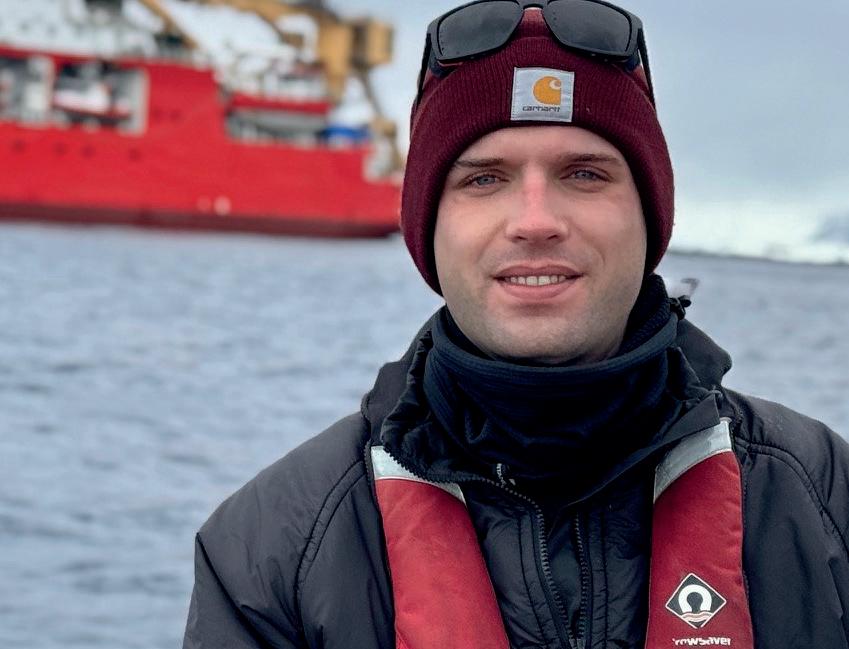
“I’ve been working with the British Antarctic Survey since August 2024, for a period of training before travelling to Rothera Research Station in November 2024. Rothera is the largest British base, with over 150 station personnel over summer, and 40 of us over winter.
“I’m responsible for the station’s boats and boating operations. On any given day, I might be taking boats right up to glaciers, whale spotting, or working with highly sensitive scientific instruments.
“Amongst other things, we run the longest standing Antarctic diving programme – and one of very few that will dive beneath sea ice in winter. Although I’m here for fifteen continuous months, the privilege of living in Antarctica and sense of achievement in supporting a globally significant scientific program make it all worth it.”

Katie and Harry are due to marry this year – wishing this adventurous pair of Exonians every happiness!

My latest book, Clinical Negligence: Sixth Edition, is a tribute to all those who have taught me – especially the teachers at Exeter School – and those that stood on the touchline in the pouring rain on a miserable Saturday afternoon whilst we got thrashed at rugby.
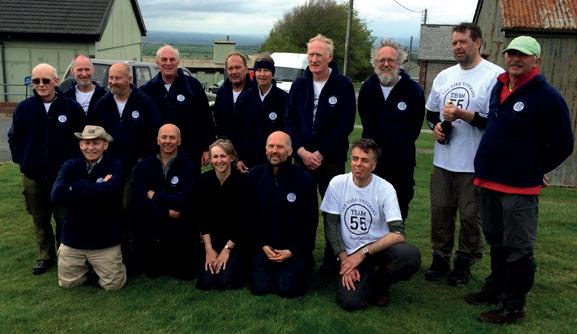
Bunny, as featured in ‘Schoolmates to Soulmates’, recently shared this fantastic photo from 2015, marking the 55th anniversary of her Ten Tors team’s competition alongside a number of Exonians.
Dr Piers Buchanan, based at the Met Office, plays a pivotal role in leading the research and development efforts aimed at providing weather and climate services to the aviation industries. He shared, “Being Master of Ceremonies for the World Meteorological Organisation (WMO) AeroMetSci Conference in Geneva, Switzerland in 2024, I gave the opening and closing speeches as well as led the organisation of the event. WMO, a division of the United Nations, works to enhance weather and climate understanding and mitigation through international cooperation. AeroMetSci brought together around 150 global experts in the aviation sector to address these critical issues”.
Front row, L to R: John Farbrother, Keith Briggs (1967-1974), Jo Mason, Andy Briggs (1969-1976), Bill Foster (1968-1975). Back Row L to R: Keith Down, Peter Rider, Bob Barnes (OE), Steve Hodder (1969-1976), Richard Sharman (1970-1978), Bunny Briggs (St Margaret’s), Stuart Eyles (19681975), Mike Shere (1967-1974), Andy Mason, Geoff Briggs (1966-1973).


“I studied European Studies (European politics, history and economics) with French at Manchester. Encouraged by former house master George Ayres (staff, 1961-1993) and Harry Guest (staff, 1972-1991), my first job after university was teaching English in Japan for the Japanese Ministry of Education (Monbusho) on a joint British/Japanese govt scheme which evolved into the JET programme.

Another alumnus that took part in University Challenge is Peter West. He had this to tell of his experience, “I was on University Challenge in about 1969. I met Bamber Gascoigne. At the time, progress to the later rounds rested on three wins. We won two but lost the third. My biblical knowledge went down well with my future in-laws – knowledge obtained outside school though as I had to go to Catholic lessons in Heavitree to avoid the “corruption” of the Anglicans in chapel! I think I did most of my homework in the late room during chapel. Still married to that student I met in 1968”.
“I returned to the UK and the City where I became a Eurobond trader. The combination of trading experience and Japanese language ability led to Chase Manhattan bank employing me in Tokyo. After two years with them I was headhunted by Deutsche Bank for whom I subsequently worked in Tokyo, Hong Kong, Frankfurt and London for the next 12 years.
“With my family, I moved back to London in 2001 to work for various financial institutions including WestLB and Daiwa. I currently travel between homes in the UK, France and Spain. I am active in my current town twinning associations – UK, France and Germany – and in various groups aiming to solve issues for British citizens created by Brexit. I was lobbying MPs in Parliament just this week in fact.”
We’ve made every effort to include all the news we’ve received but apologise if any updates have been inadvertently overlooked. If something has been missed, please don’t hesitate to get in touch, and we will do our best to rectify this. We also encourage you to stay in touch - hearing from our alumni is always a delight!
The school is sad to announce the passing of the following Exonians. A ★ symbol indicates that a fuller obituary has been published on the school website, at www.exeterschool.org.uk/obituaries.
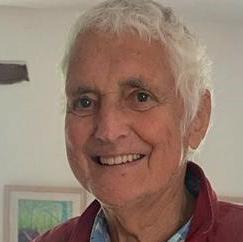
Ian Davis (staff, 1969-1974; 1991-2002) 1943-2024 ★
After graduating in German at Swansea University in 1966, Ian did his PGCE at Birmingham University, which is where he met his future wife, Pip (Madeleine). Ian completed his teaching practice in the modern languages department at King Edward’s, Aston, before taking up a post there for a year. He then moved to Paris and taught English at the Berlitz School.
Since Pip, as of August 1969 his wife, had to be based in Exeter for the following academic year, Ian needed to find a teaching post in the area, and was delighted to be appointed by Exeter School. And so started Ian’s first of two ‘lives’ at Exeter School, which would be for him the happiest and most rewarding years of his whole teaching career.
During Ian’s first spell at Exeter School, he taught both German and French, and also coached rugby, hockey and cricket, as well as introducing basketball to the school. He was a natural teacher, a genuine schoolmaster, whose enthusiasm, drive and positive, caring personality endeared him to students and colleagues alike.
In 1974, Ian made a decision to gain further experience in state
education and moved to Tiverton Grammar School, becoming Head of Languages two years later as it was reorganised into a comprehensive school. Ian was ambitious, and in 1980 he was appointed Deputy Head at The King’s School, Ottery St Mary. In the late 80s, after a spell as Acting Headmaster, which coincided nationally with strong trade union action from some teachers and a work to rule with limited hours, which did not sit well with his belief of the role of a teacher, he left, and became a Financial Advisor with moderate success for two years. The lure of a return to classroom teaching grew stronger and when a vacancy occurred at Exeter School in the modern languages department in 1991, Ian was delighted to be reappointed for his 2nd ‘life’ at Exeter School, where he remained until his retirement in 2002.
Ian’s return to teaching and to Exeter School was, without any doubt, the profession’s and the school’s gain, repaying the trust shown him in spade loads. He had lost none of his language proficiency and his classroom delivery remained slick and assured. When the opportunity arose a couple of years later, he also led the German department with aplomb. He ran the centre for excellence for PGCE trainees from the school of education with his typical efficiency and humour.
Ian faced his terminal illness with dignity, in denial and ever cheerful till nearly the end. As his close friend of 55 years and ex-colleague John Jago wrote “Ian played his ‘game of life’ enthusiastically, thoughtfully and with great success.”
Pip (Madeleine) Davis and Mike Wilcock (staff, 1986-2020)

(staff, 1991-2014) 1957-2024
One of the nicest, calmest and wisest men you could possibly meet. If there was ever a pupil or colleague who needed advice, Richard could be relied upon to respond in the most sensible and measured way. Richard understood people – he was intuitive in the way he could gauge a mood or a tone and painstakingly fair in everything he did.
Richard was educated at Dulwich College and the Queen’s College, Oxford. He married Hilary in 1990 and so began 33 years which would take them to Bedford, Cullompton, Stoke Canon, Colyton and Gloucester. He began his teaching career at Hampton School, later moving to Bedford School. In 1991, he took the position of Head of Modern Languages at Exeter School, and he remained here until his retirement in 2014, finding happiness and contentment in Devon.
He was ‘the consummate schoolmaster’. Not concerned with seeking the spotlight, his ability and presence nonetheless greatly enhanced any endeavour in which he participated, turning his hand to anything from rugby coaching to
David Harrower (Daw, 1956-1961) 1945-2017
cricket umpiring, from emergency Latin teaching to chair of staff common room, from running front of house for theatre productions and concerts to helping with Ten Tors, and he spent countless weekends driving minibuses to the furthest corners of the West Country, not to mention the numerous language trips he led.
He provided a strong lead for the basses in the school’s choral society. He was a patient and highly knowledgeable French teacher, taking particular pleasure in introducing his older pupils to classic literature. He was Head of Acland for fourteen years, and he approached his pastoral responsibilities with great care and dedication. Former colleagues, pupils and parents have told of the support and guidance that he offered, and of his unfailing kindness.
Richard and Hilary’s two children both enjoyed Exeter School too and all that it offered. Michael was an outstanding mathematician and musician, Eleanor a marvellous linguist, musician and sportswoman. Just as with everything else he did, Richard managed to share out his talents fairly between his children too!
During his all too short retirement, he devoted time to volunteering – as a school governor and trustee for a number of organisations and taking on a range of varied tasks in the churches, helping to build community, always quietly challenging any kind of discrimination or injustice. He continued to draw deeply on his faith, particularly during his final illness. A mark of the esteem in which he was held was the number of people who attended his funeral – not to mention the three bishops! He was a man of courage, integrity, compassion, gentleness and love. His relationships were always defined by laughter, unwavering loyalty and profound love and friendship. His death leaves a huge gap in all our lives.
Alice Francis (staff, 2003-2024), Mike Porter (staff, 1986-2020) and Mike Wilcock (staff, 1986-2020)
Ian Russell (Raleigh, 1955-1963) 1944-2022
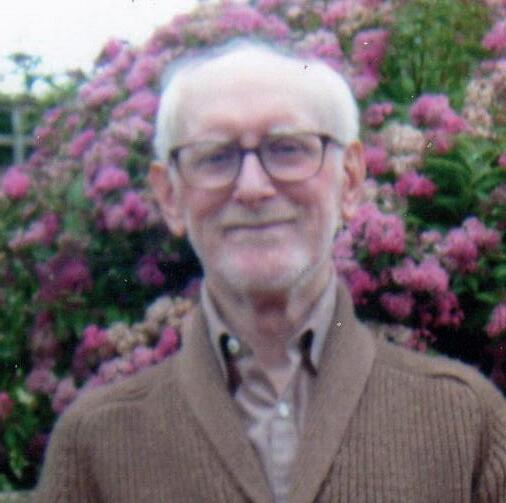
John Eddy Day (Buller, 1933-1939) 1922-2016

(Buller, 1954-1959) 1941-2024 (School House, 1943-1947) 1924-2024
Iknew Stephen Derek both as a colleague and as a friend. We both worked in the timetables section at the Western Region Paddington HQ in the 1970s and early 1980s.
Stephen grew up in Exmouth and, after Exeter School, worked at the Southern Region Exeter District office at Exeter Central. His railway connection was furthered as he married Mary, daughter of Reg Salway, one of the Exmouth signalmen.
After the Exeter district office closed with the transfer of many Southern lines, to be decimated by the Western Region (WR), he moved to Reading to work at WRHQ. In retirement, Stephen and Mary stayed in Reading.
Stephen had a great knowledge of the Southern in the West Country, particularly regarding operational matters, with meticulous record keeping and attention to detail. His pictures, and many contributions to various publications, are an invaluable record of times gone by.
Martin White (friend and rail enthusiast)
Dad was the proudest of Old Exonians and stayed in touch with both his contemporaries and some younger ex-pupils whom he met at reunions.
Both the history and future of the school were close to his heart, and he wore the OE tie with great pride.
John was widowed at the age of 84 and, thanks to his energy and zest for life, retained his sense of purpose and need for mental stimulation. He continued as Chairman of the Midlands Cancer Research UK fundraising team and his commitment never wavered. His team raised over £250k.
In 2016 Dad received a Flame of Hope Award from Cancer Researchtheir annual awards to celebrate the achievements of the most outstanding and inspiring volunteers.
Up until July 2024 he was still driving his sports car around the local area – an indefatigable spirit.
He is missed every day by his two daughters, sons in law and five grandchildren.
Susie Cleverly and Jenny Williams, John’s daughters
John Barri Hopkins (Raleigh, 1946-1953) 1936-2023

(Daw, 1944-1951) 1935-2024 ★
Edward was born in Exeter in September 1935. At an early age, Edward lost his mother, and by 18, his father had passed, a daunting prospect for anyone of that age. The sea proved to be Edward’s escape. He was born with the sea in his blood and spent many happy hours in a dinghy exploring the River Exe. He signed up to join the merchant navy as a deck cadet and progressed to the rank of second mate, acting on occasions as chief officer.
On leave between trips, he met his future wife, Jackey, at a dance in Exeter. Jackey accepted Edward’s marriage proposal on condition that he stop going to sea. Newly married, Edward and Jackey moved to Southampton so Edward could complete his ship’s master’s certificate.
Leaving a career at sea and finding employment ashore is daunting, but Edward rose to the challenge by studying for a BSc in nautical studies at Plymouth University specialising in naval architecture. He became a member of the Royal Institute of Naval Architecture.
After finishing his degree and
Philip Robin Mogridge (Crossing, 1952-1960) 1941-2024
securing a ship management job with Hayne Line in London, they moved to Surrey. Later, Edward took up a senior ship operations role with Common Brothers in Newcastle.
It was only a short time before Edward made another job move, returning to London for an operations director position with Burmah Oil.
Later, they bought a small farm outside Moretonhampstead. Edward became a farmer while starting new ventures in both marine arbitration and farm insurance.
Back in 1985, Edward had joined the Honourable Company of Master Mariners, a London livery company. In 2005 Edward was elevated to Livery and gained the Freedom of the City of London.
With more time on their hands, Jackey and Edward traveled to far-flung places in Asia, including visiting Tristram, Sarah, and grandchildren Tom and Eddy in Australia.
Unsurprisingly, Edward maintained sailing and maritime interests through retirement, and, more recently, chaired the Exeter branch of the Merchant Navy Association.
Edward was also a driver for Moorcare, a service he would depend on these past months to take him to hospital appointments. He was also a leading light in the Moretonhampstead Cub Scouts and was their treasurer.
He had a strong sense of duty to the community and will be missed. He leaves a son, Tristram, and daughter Miranda, and three grandchildren, Samson, Thomas and Edward.
Alex Leger (1958-1966), Edward’s brother-in-law
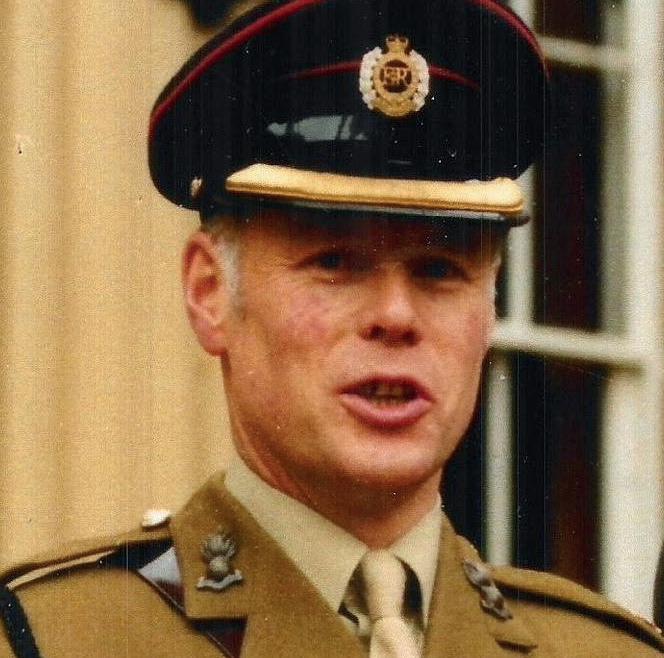
(Raleigh, 1952-1956)
1938-2024
David joined his brother Tony at the school in the early 1950s, travelling to Exeter each morning on the 8.04 steam train from Newton Abbot, as one of the train boys.
This experience fostered a longtime interest in railways, whilst his membership of the Exeter School CCF prompted a similar long lived involvement with all things military. He left school after taking O Levels to train as an architect at Portsmouth University, returning to join an architectural practice in Exeter.
It was while working in Exeter that he joined the TA, remaining a member when he moved to London, and gaining a commission.
He finally retired with the rank of major but then filled his time with the rallying of classic cars and morris dancing.
David passed away peacefully at home on March 30 2024 and will be much missed by those whose life he touched.
Tony Hough, David’s brother (Raleigh, 1949-1955)
Douglas Saunders (Raleigh, 1941-1944) 1929-2024
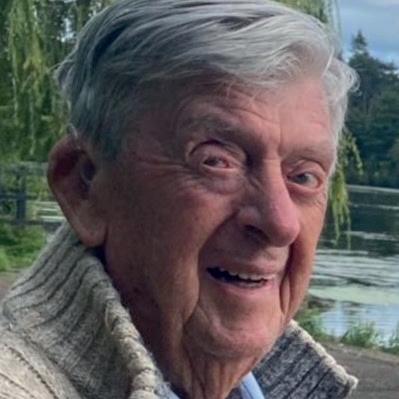
(Buller, 1944-1946) 1933-2024 ★
David was born in Cardiff on 16 Nov 1933 to Daniel and Kathleen Mahoney. Having spent his early years growing up in South Wales, upon the start of the Second World War and the

Keith Manley
(Drake, 1943-1950) 1931-2024 ★
Keith had a long and successful career in business and was finance director of Dr Barnardo’s
David Edward Blackmore (Crossing, 1954-1960) 1943-2024
Alan R K Smith (School House, 1944-1951) 1934-2024
bombing of Cardiff, David’s family relocated to Exeter where he attended Exeter School. The school was one of David’s happy places and his time at Exeter gave him an excellent grounding for his future life.
David and his parents had the misfortune of being ‘bombed out’ whilst living in Exeter and so relocated back to Cardiff. David completed his education at Cathays High School in Cardiff where he achieved matriculation in eight subjects and a distinction in English and French.
David started his working life at the City Hall in Cardiff on 7 September 1949. He had been promoted to audit team leader before he was called upon to complete his national service in 1951. Following national service David returned to Cardiff City Council for 4 more years before in 1957 moving to Newport County Borough Council as a senior accountancy assistant and finally qualifying as a public finance accountant in 1960. It was also during this time that David met Rosalie, they later married in Newport in August 1959, and were married for over 60 years before her passing in June 2020.
from 1973 to 1992.
He was born in Exeter to Stanley (‘Les’) Manley and Eva Mairs. Les was a gardener and Eva worked in her family’s tobacconist shop. Sister Maureen was born three years later; she had a short and troubled life.
In 1943 he entered Exeter School where he excelled in maths and languages. He won several prizes and took a keen interest in drama, music and chess. In 1950 several of his schoolmates went on to study at Cambridge University but he preferred to do his national service and find a career. As a private in the British Army, he was assigned to the communications intelligence unit of MI6 where he learned codebreaking and Chinese (the Korean War had broken out). He completed his national service at the rank of lance corporal.
In 1953 his family moved to Tottenham in London where he qualified as a chartered accountant. After various auditing jobs he took up a role as financial controller
In 1961, David moved to Worthing where he was initially appointed as a senior internal auditor at Worthing Borough Council before moving to chief internal auditor and then Head of the Financial Services section in 1969. In 1973 at the age of 40 he became a chief officer at Worthing borough council in the role of borough management services and personnel officer, a role which he held throughout the remainder of his career. He retired from his role at Worthing Borough Council at the age of 58.
In retirement David fulfilled his wish to go and see the world with Rosalie, they travelled as far as Australia, New Zealand, Canada, South Africa and Hong Kong, as well as seeing a large part of Europe.
David had two children, Ian and Judith, and was grandfather to Alex, Nicole, Erin and Calum.
David will be remembered as a man who was very kind, thoughtful, generous, wise with a great sense of humour and an amazing memory.
Ian Mahoney, David’s son
with British Steel Construction. In February 1973 he became Dr Barnardo’s chief accountant promoted to finance director later that year, he quickly established himself as an authority on managing not-for-profit organizations. His work brought him into contact with friends and patrons of the charity including the then Prime Minister John Major, Princess Margaret and Princess Diana.
Keith met Jean Donald at a Tottenham table tennis club in 1959 and they married two years later. After their divorce in 1986 Keith married Sylvia Bones (d. 2014).
Mild, modest, kind and generous, Keith had a gentle sense of humour, a sweet tooth and loved a tipple. He was a good man.
He is survived by his first wife, four children, six grandchildren and four great-grandchildren.
Jonathan Manley, Keith’s son
Roger Dawe (Daw, 1950-1959) 1942-2024

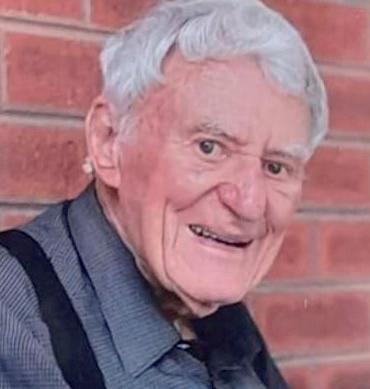
Donald William (Don) Nott
(Raleigh, 1943-1950) 1932-2024 ★
Ian Scott (Crossing, 1963-1970) 1952-2023
(School House, 1972-1982) 1964-2024
My elder brother, Andy passed away on 17 December 2024 aged 59. He joined the Devon and Dorset Regiment in 1983 initially serving in Northern Ireland. Thereafter, and amongst many other places he served in Berlin, Germany; he was one of the last to guard Rudolph Hess in Spandau. He left the British Army and joined the New Zealand Army for a short period before rejoining the Colours. He was a natural soldier in the field. Fiercely fit, fiercely loyal and utterly professional. Such were his abilities upon his return from New Zealand he was interviewed by the then
My brother, Don, had a long and varied life.
He attended the Royal Aircraft Establishment at Farnborough but, as a result of deafness caused by a cycle accident, he was unable to become a pilot, so he left and went to Westland Helicopters in Yeovil. There he met Jill who became his wife. Don spent a year at college near Edinburgh and then did an MA at Keble College Oxford spending a year as a Don after graduating. Their first daughter Linda was born at this time.
After Oxford the family went to what was then Marandellas (Marondera) Southern Rhodesia, and Don taught maths at Peterhouse School. When second daughter Debbie arrived, he had changed career and worked in Salisbury, S. Rhodesia with Alcan Industries, Canada and then educational sales. The family also grew with twins Helen and Claire being born in 1961.
A move to South Africa in 1964 saw Don managing the Durban Coca-Cola factory, where he took a sabbatical and gained an MBA at Harvard. Don then managed
commanding officer of the Devon and Dorset Regiment on the Friday and back in uniform on the Monday. Andy was later invalided out of the Army in consequence of injuries sustained and attributable to his service. These injuries contributed to his untimely departure. Andy lived by his prep school’s (Durlston Court) motto “erectus non elatus” (Be proud not boastful). He will be remembered and spoken of often – and then there were two… “Semper Fidelis”.
Nigel Moreland (School House, 1980-1986), Andrew’s brother
Opposite is a picture of Andy in South Georgia in the 80s on a six month tour.
Midland Aluminium Ltd followed by Sunset Furniture in Benoni South Africa. Don opened his own consulting business in Johannesburg and continued with this until the family came to live in England in 1977, Don acting as a turnaround man for a carpet group around Worcester. Then to Ireland for a time with Flair, the bathroom specialists. Jill missed Africa so they returned there in 1979, and Don became the managing director of the Malawi Development Corporation. In 1981 they moved to back to Salisbury (which is now called Harare in Zimbabwe) as he was offered the position as managing director of Industrial Steel & Pipe Ltd. In 1987 they moved to Johannesburg where Don purchased a stationery shop but then decided to semi-retire and went back to his love of teaching where he taught business management and economics. In 1998 he decided to ‘retire’ in Howick, Kwa- Zulu Natal in the Amberglen retirement village where Jill still resides.
Rodney Nott (Raleigh, 1956-1961), Don’s brother
Christopher Horsley (School House, 1950-1956) 1937-2025 ★

(School House, 1935-1940) 1921-2024
Anthony was born in Liverpool and was known to his family and friends as Tony. The Orchard family moved south to Devon where he was educated at Exeter School from 1935-1940. He spent five happy years in School House, and in later life loved returning to the school for Old Exonian days and dinners. His granddaughter, Sara Orchard (1998-2000), would later join Exeter School. This helped encourage many more happy visits to Victoria Park Road where he would proudly wear his school tie.
Upon leaving Exeter School he was accepted to study civil engineering at St. John’s College, Cambridge. In 1942 he completed a three-year course in just two years
and was called up a few months later to serve in World War II, spending the next five years in the army. He went on to India and Burma before returning home after VJ Day to marry his beloved Barbara. After working for two civil engineering contractors, he joined Sir Murdoch MacDonald and Partners in 1954. He worked on many projects which took him to Scotland, Watlington in Norfolk, overseas in West and East Pakistan, back home to London and living in Sunbury on Thames before finally settling in the village of Foxton while working in Cambridge.
Tony and Barbara are survived by three loving children, Malcolm, Timothy and Sharan, five grandchildren and five great grandchildren.
Tony was an active part of the community in Foxton until his last day. Ten days before his death, on Sunday 10th November he was at the Foxton cenotaph reading out the names of the fallen in World Wars I & II.
Sara Orchard (1998-2000), Anthony’s granddaughter
John died at his home in Broadclyst on 11 January aged 89 years. In his early years he played in a jazz band called ‘The Crescent City Stompers’, but he was better known for setting up the first post-war night club in Exeter. It was down on the quay, and John fittingly called it ‘The Quay Club’.
Kevin White (1953-1961)
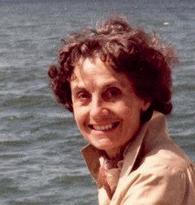
(staff, 2001-2003) 1924-2024
My mother taught art and history of art and architecture at St Margaret’s between 1965 and 1993 with some additional classes following retirement. She then taught at Exeter School between 2001 and 2003. She was passionate about her work and loved being in school with the students and on the many school trips. She took pupils from both St Margaret’s and Exeter School to Paris, Florence and Venice to visit galleries and soak up the
architecture and atmosphere. She also accompanied other school trips such as the cruise and the twinning visits. She loved to travel, which she did extensively and adventurously, not only in Europe but to, for example, China, India, Syria and the then Soviet Union. She went to university at Edinburgh just after the war, to art college in New Zealand and teacher training in Aberdeen. She was very creative and an innovative artist and designer in her own right.
As a teacher she always saw the best in her students and delighted in what they produced. Displaying their work well was very important to her and the walls were always covered with exhibitions that changed frequently to make sure a lot was seen and appreciated. She put care into mounting and arranging the students’ work and valued it highly. She found teaching exciting and satisfying and enjoyed experimenting with techniques, styles, methods and materials and passing these on to the students. She enjoyed arranging a still life or getting the girls to pose for each other to sketch. The art room was a lively and supportive space. She introduced the students to a range of artists to give them not just an education but inspiration, encouragement and different ways of seeing.
When out with her, even in recent years, we were often stopped by someone who said she had taught them and how influential she had been, or how much they had enjoyed art. That gave her great pleasure.
She had a ready smile and a willingness to help and do what was needed with skill and attention to detail. She was full of warmth, ideas, information and praise and the best teacher I know.
She died peacefully at home with me. She is hugely missed.
Annie Reid, Dorothy’s daughter

David Michael Rogers, born in Rickmansworth in 1938, passed away peacefully on 16th August 2024 at the age of 86. He is survived by his loving partner, Sheila, their twin daughters, Karen and Tracy, and 13 grandchildren and greatgrandchildren.
David’s early life in Sidmouth, Devon, shaped his lifelong passions. He attended Exeter School, where he excelled academically and formed lasting friendships. It was also in Sidmouth where he met his beloved Sheila.
A chartered accountant, David’s entrepreneurial spirit led him to establish a successful practice in Brighton. His professional achievements extended to a notable tax resolution at the UK Supreme Court. Beyond his practice, David’s ventures included sponsoring British films and investing in UK properties.
David’s love for sports was a defining characteristic. He was a keen rugby, tennis, and cricket enthusiast and even took up skiing at the age of forty.
David was a devoted father, and friend. His legacy of modesty, hard work (he never retired), and kindness will continue to inspire those fortunate enough to have known him.
James
Taylor, David’s grandson

Roger Smith was born in Corsham, Wiltshire to Charles and Elsie Smith but within a few years the family had moved to Woodbury just outside of Exeter. He grew up loving the outdoors and attended Exeter School where he excelled at rugby and swimming. In January 1960 he won a flying scholarship to RAF Cranwell Officer Training College and left Exeter School before sitting his A Levels. He served in the RAF from 1960-1973, flying Valiants at RAF Honington, becoming a flying instructor on Jet Provosts at RAF Acklington. His final posting was to RAF Halton. Wishing to continue to fly he trained as a commercial pilot. He had a successful career as a BOAC first officer for five years and then as a captain for Britannia Airways for the following 22 years before retiring aged 60. When not flying Roger started to umpire tennis matches and quickly became very well regarded. He had notable run-ins with some of the more difficult players, in particular the 1984 Queens semi-final with John McEnroe. He lived a full and happy retirement, travelling, playing golf and spending time with friends and family. Roger passed away aged 83 and is survived by his wife Sheila, two daughters, Carolyn and Nicola, and six grandchildren.
Nicola Weeks, Roger’s daughter

(Drake, 1933-1943)
1925-2024 ★
Born on 21 February 1925, in Babbacombe, Charles was the only son of Charles Francis Waterfall and Ada Waterfall (née Duckworth). He was the youngest of five children, with four elder sisters. His father was in the Indian Civil Service and at the time was based in Nagpur in the Central Provinces (now Maharashtra). Shortly after he was born, he and his mother went to India to be with his father and two youngest sisters, Helen and Ruth. His two eldest sisters, Mary and Jean, were at school in England. The children returned to England when Charles was about five years old. With their parents away in India, the children lived with their aunt in St Mary Church, Torquay and their grandparents were in an adjacent house. In 1933 the family moved to Lyndhurst Road, Exeter, near Exeter School, where Charles was enrolled in the prep school. A member of Drake House, he rose through the school becoming head boy in 1942. In 1943, with encouragement from
the school’s staff and trustees, in particular John Daw, he became an exhibitioner at St.John’s, Cambridge, studying the mechanical sciences Tripos. Due to the war the course was compressed into two years of hard work and he gained his degree in 1945.
After university, Charles found employment with Alexander Stephen’s shipyard in Glasgow. He married Joan Malkinson – who had also lived on Lyndhurst Road – at St Leonards Church, Exeter on 9 April 1949. Shortly after, Charles was sent to Malmo, Sweden, on an extended research trip, and Joan dutifully followed along a few weeks later. Returning to Scotland, their first child, Sarah, was born in November 1950 followed nearly four years later by Peter.
In 1960 the family moved to England, and later, after the children had left home, Charles took up a series of contracts in the United Arab Emirates, the Yemen and ultimately Saudi Arabia.
Joan and Charles returned to the UK in 1990, first to Gunnerside in the Yorkshire Dales, and then, in 1998, moving to the Garden Village, Richmond, North Yorkshire, whereupon Charles decided to take up bell-ringing. They moved to Greyfriars, an assisted living facility in Richmond in 2015. Joan died in December 2018, leaving Charles living alone for the first time in nearly 70 years.
On his retirement, Charles and his son, Peter, took a trip to India which included a visit to Nagpur with the hope of expanding on Charles’ memories of his childhood there.
Charles died quietly 5th August 2024 at home in Greyfriars, Richmond.
Peter Waterfall, Charles’ son
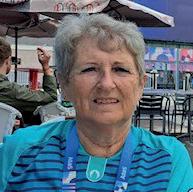
1954-2024 ★
Lesley Wybrow died very suddenly on September 23 2024 in Poitiers, of a brain haemorrhage. She was a full-time nurse at the RD&E in the paediatric unit and helped form and run the Exeter School St John Ambulance Cadet Division.
The division was set up with the full support of former Head Neil Gamble (staff, 1992-2003), and the Bursar, Peter Weeks (staff, 1982-1994). The division met every Friday afternoon as an alternative to the CCF for those in the top four years of the school.
Her help and knowledge were invaluable, enabling the division to purchase and operate a front-line ambulance. She completed 15 years in this voluntary staff position and was greatly missed when she was forced to leave due to the combined pressure of work and the division. The division closed later that year as it had not been possible to replace her services. The division was unique in being established in an independent school and relied heavily on her voluntary role.
She is greatly missed and leaves her husband, former biology teacher and Drake House Master, Dave (staff, 1974-2011) and five children, four of whom benefitted from having been taught at Exeter School.
Dave Wybrow (staff, 1974-2011)
We are very grateful to the following individuals who made gifts to the school between April 2024 and April 2025 or remembered the school with a gift in their Will. It is no exaggeration to say that your support changes lives – thank you.
Malcolm Brook (1949-1954)
Denis Pereira Gray (1943-1954)
David Hough (1952-1956)†
Michael Fermor (1951-1956)
John Jago (1949-1956; staff, 1966-1996)
John Imlach (1950-1957)
Bob Hart (1951-1959)
Richard Jowett (1948-1959)
Ian Tweedie (1952-1959)
Neil Downes (1953-1960) and Mary Downes
William Finnie (1956-1961)
Richard Spiller (1956-1961)
Gordon Twinberrow (1957-1962)
Anonymous (1955-1962)
Dair Farrar-Hockley (1960-1965)
Richard Barrett (1957-1966)
Robert Johns (1960-1966)
Chris Burgoyne (1961-1968)
Paul Entwistle (1958-1968)
Michael France (1962-1968)
Jamie Mackay (1957-1968)
Robert Wilson (1961-1968)
Julian Brandling-Harris (1962-1969)
Martin Smith (1963-1970)
Tim Davies (1964-1971)
Jon Spencer (1967-1972)
Nicholas Treble (1966-1972)
Anonymous (1964-1972) and spouse
Tim Dashwood (1968-1973)
Matthew Towill (1968-1973)
Anonymous (1966-1973)
Chris Bush (1963-1974)
Paul Harrison (1968-1975)
Paul Thomas (1968-1975)
John Wheeler (1964-1975)
Stephen Hodder (1969-1976; governor)
Andrew Martin (1974-1976)
Martin Stone (1969-1976)
Richard Gilpin (1974-1978)
Andrew Hayward (1971-1978)
Paul Beckett (1973-1980)
Andrew Bulley (1969-1980)
Steve Perring (1977-1981)
Stephen Chester (1976-1982)
Emad George (1976-1982)

Peter Kumik (1976-1982)
Fred Mayall (1971-1982)
Duncan Sankey (1976-1982)
Martin and Wendy Barratt (1982-1983)
Eddie George (1977-1983)
Ian King (1977-1983)
Jonathan Webber (1978-1984)
Stephen Pepper (1978-1985)
Tony Venn (1982-1985)
Philip Waggett (1979-1985)
Paul Bolden (1976-1986)
Matthew Stibbe (1982-1987)
Paul Darnley (1982-1988)
Sharon Hiley (1986-1988)
Stephen Wickers (1984-1988) and Kirsten Wickers
Simon Douglass (1982-1989)
Philip Mattison (1982-1989)
Guy Northover (1984-1989)
Ross Saunders (1984-1989)
Anonymous (1987-1989)
Toby Quartley (1986-1992)
David Brickell (1991-1993)
Daniel Smith (1989-1993)
Paul Cann (1987-1994)
Ash Retter (1985-1996)
Governors
Beverley Meeke (governor, 2005-2017)
Parents
Vasile Badescu and Lucia Popescu
James and Sarah Bowen
Paul Burke and Penny Lupton
Miquel and Vania Ferreira Castro
Tim and Svetlana Johns
Greg and Jill Williams
Staff
Graham Bone (staff, 2004-present)
George Garner (staff, 1982-1994)
Miles MacEacharn (staff, 2018-present)
Ailsa McGregor (staff, 2023-2025)
Brian Moore (staff, 2000-2004)
Louise Simpson (Head, 2020-present)
Liz Williams (staff, 2020-present)
Alice Holohan (staff, 2021-present)
Bethan Rose (staff, 2022-present)
Jonny Titchin (staff, 2023-present)
Anonymous
Friends of Exeter School
Philip Mullins
John Mullins
Marcus Paul
All care has been taken to ensure the accuracy of this list. However, if any error has occurred please accept our apologies and notify the Alumni and Development office so that we can amend our records.

Make a gift and change a life
To fi nd out how to make a gift and change a life contact Alice Holohan at asah@exeterschool.org.uk or 01392 458 940 or visit our website: bit.ly/MakeAGiftAndChangeALife
